Senior School Pathways
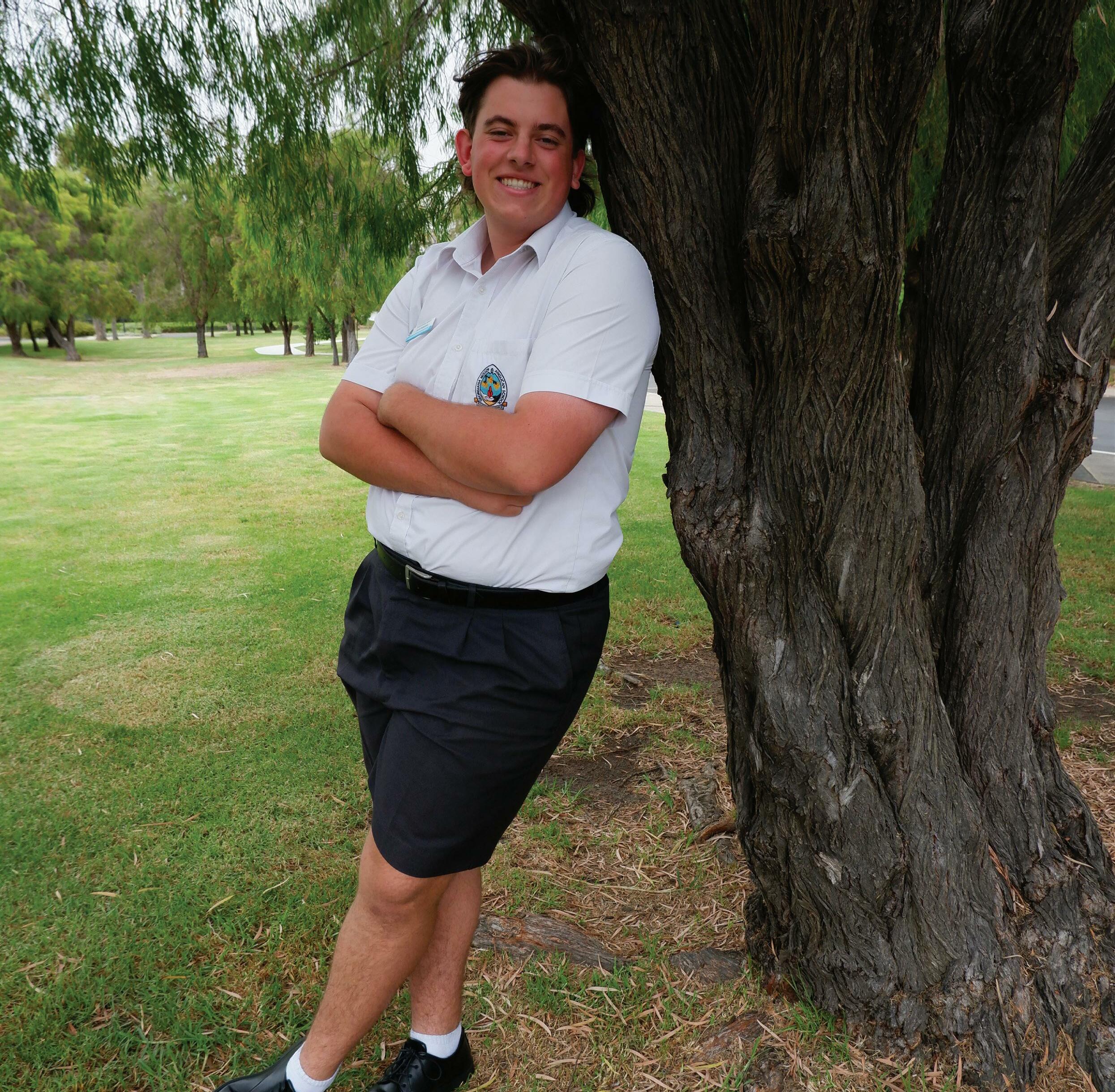
Est . 2003 GEORGIANA MOLLOY ANGLICAN SCHOOL 2023
GMAS has a strong track record of delivering exceptional academic results and well-rounded, confident and skilled graduates.
As a school that values the unique potential of each student under our care, we believe in offering a supportive learning environment and a diverse curriculum that inspires each individual to follow their passion.
As students progress through Secondary School, they will start to consider what future options or pathways to explore, based on their own personal preferences, skills and interests.
In Year 10, students are asked to select the subjects they wish to study in Years 11 and 12.
When choosing an academic pathway, students will be supported in making the best decision for themselves through a combination of consultation and counselling. The input of parents and caregivers is vital to this process and it is the strong relationship between the school, home and students that ensures students are in a position to make informed subject selection decisions.
I invite you to explore the offerings in this handbook. I hope it inspires you and guides you towards your future aspirations beyond GMAS.
Mr Stephen Treloar Head of Senior School
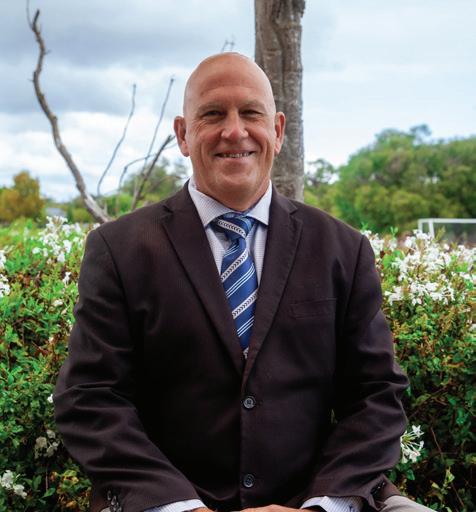
The information provided in this publication is correct at the time of printing and may be subject to change depending on course enrolments and course provider requirements.
 MR
MR
STEPHEN TRELOAR HEAD OF SENIOR SCHOOL

We encourage independence, confidence and a sense of self by providing a supportive and nurturing learning environment in which students feel safe to take risks.
Why you should study at GMAS
Diverse Curriculum

With over 60 academic subjects and over 60 VET Certificate courses on offer, our Senior School curriculum caters for a wide range of interests. GMAS challenges our students to make the most of their capabilities while equipping them with the skills, knowledge and experience required to pursue their career and ambitions after they leave school.
Links and Connections
Flexible Study Options
Students at GMAS are able to access a variety of pathways to university, TAFE or the workplace. In Years 11 and 12, students have the option to:
• select an academic pathway comprising of ATAR subjects, general subjects or a combination of both
• engage in part time offsite Vocational Education & Training (VET) at one of our partner training institutes
• obtain a Certificate I, II or III qualification
• enter into a school-based traineeship
• participate in workplace (on the job) learning
• enrol in a certified endorsed program
• engage in a combination of the above.
Our students benefit from our strong links with Australian universities and training organisations. Through our connections, students have been able to complete the Central Queensland University Start Uni Now program and Edith Cowan University’s University Preparation courses. Our music students have had access to leading performers and teachers from the University of Western Australia Music department and the Western Australian Academy of Performing Arts. We also hold strong relationships with South Regional TAFE and the Bunbury Regional Trade Training Centre to deliver our VET pathways. GMAS also has partnerships with Murdoch University and Curtin University to provide alternate entry pathways via a variety of qualifications.
Dedicated VET Team
Our students are supported by our dedicated VET department, who ensure that students are well informed in their chosen pathways and career decisions. The VET department provides careers guidance to all students as a group or individually, coordinates work experience and placements, VET certification, careers events, and liaises with tertiary and other training institutes to deliver a comprehensive VET program at school.
1 2 3 4
5
Exceptional Staff
Our teaching staff are some of the best in the country. They go ‘above and beyond’ to ensure that each student is fully supported throughout their Senior School journey. They aren’t just traditional teachers, they are role models, counsellors, cheerleaders and mentors who are deeply committed to seeing every student thrive. Students requiring additional support have access to free after-school tutoring for most subjects.
Individual Learning Plans
GMAS provides an inclusive environment for students’ individual learning needs, including our gifted and talented students and those requiring learning support. Students of all abilities are nurtured and encouraged to develop their own unique skill sets and individual strengths.
9

Leadership Opportunities
Student Wellbeing
Our pastoral care program is woven throughout our daily operations and curriculum, ensuring each student’s academic, emotional, social, physical and spiritual needs are being supported. Students have direct access to counselling, chaplaincy and learning support. They also have the opportunity to participate in over 50 cocurricular sporting, academic and recreational pursuits, designed to instil a strong sense of wellbeing.
GMAS offers a diverse range of leadership opportunities for all Senior School students. Student leaders are role models for other students in the School and are in a position to affect positive change on campus. Students are supported in becoming effective leaders with enhanced public speaking, teamwork, problem solving and organisational skills.
Learning Environment
Set amid beautiful open planned and landscaped grounds comprising over 15 hectares, the school offers modern, technology-rich facilities which create an environment conducive to learning and social engagement. The entire school’s infrastructure is in place to support and enhance the educational curriculum and co-curricular programs on offer.
Personal Excellence
GMAS is a school that strives to promote excellence in all things, challenging the students to go beyond mediocrity and achieve their full potential. Our students are encouraged to become independent, critical thinkers with an ongoing love of learning. Each school term, we recognise and reward students who have achieved personal excellence or who have made significant contribution in the areas of arts, service, academia or sport.
P5
6 7 8
10
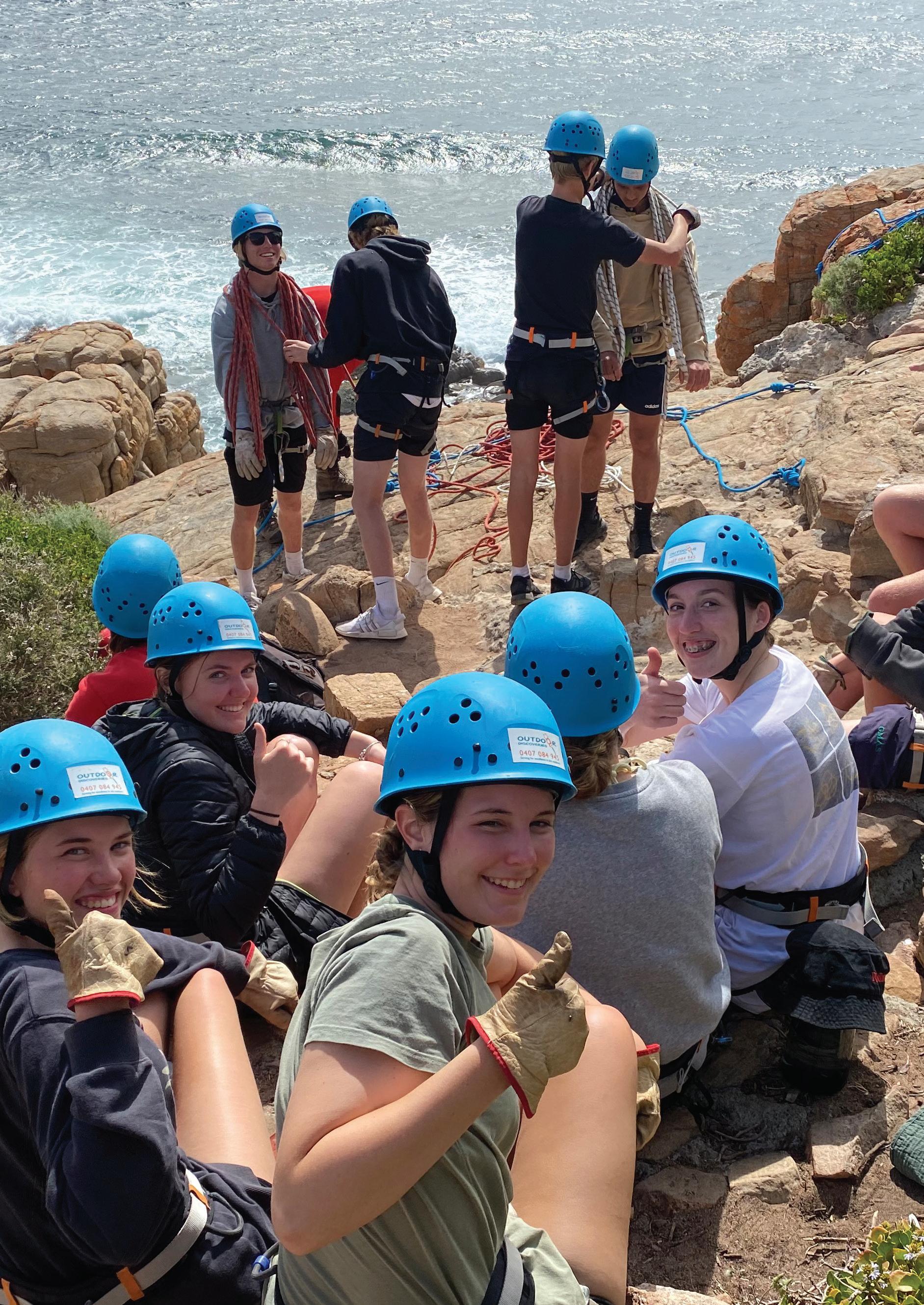
Year 10
Curriculum
As students enter into Senior School, the curriculum is thoughtfully designed to support the development of the whole person, a person with positive self-image who seeks the best from their ability and respects the rights of others. Year 10 is a formation year where we prepare students for the challenges of senior schooling. It is a time when students are counselled into making informed decisions regarding their course selection.
All Year 10 courses at GMAS are based on the Western Australian Curriculum, accessible on the School Curriculum and Standards Authority (SCSA) website.

Students need to be aware that elective selections made in Year 10 and the level of study (streams and grades) completed in core course learning areas (English, Mathematics, Science, and Humanities) will impact on courses available to study in Years 11 and 12.
It is important that when students are in Year 10, they are aware of the desired pre-requisites for entering WACE courses. These pre-requisites can be viewed in the Year 11 and 12 section of this handbook.
What is Streaming?
Core learning areas are streamed into courses to enable staff to effectively prepare students for their work in selected WACE courses. Streaming is based on the student’s achievements to date. Courses are quite different in the level of assessment, therefore movement by students is restricted between streams, but is reviewed progressively for appropriate placement of students.
Timetabling
Timetabling in Year 10 consists of two major components. The first component comprises of the compulsory (core) courses of English (4 periods), Mathematics (4 periods), Science (4 periods) and Humanities and Social Sciences (4 periods). In addition, students are required to study the following non-core compulsory courses: Physical Education (2 periods), Christian Religious Studies (1 period), Health Education (1 period) and Work Studies (1 period). The second component comprises of two elective (non-core) courses per year, each having 2 allocated periods each week. These courses are outlined in the pages to follow. Minimum enrolments in a course are required for it to run.
P7
YEAR 10
Year 10 CourseOffering

ENGLISH
Contact: Ms Paisley Walker
The Year 10 English curriculum is built around the three interrelated strands of language, literature and literacy. Teaching and learning programs balance and integrate all three strands. Together, the strands focus on developing students’ knowledge, understanding and skills in listening, reading, viewing, speaking, writing and creating. Competency in Year 10 English is essential for many courses in Year 11.
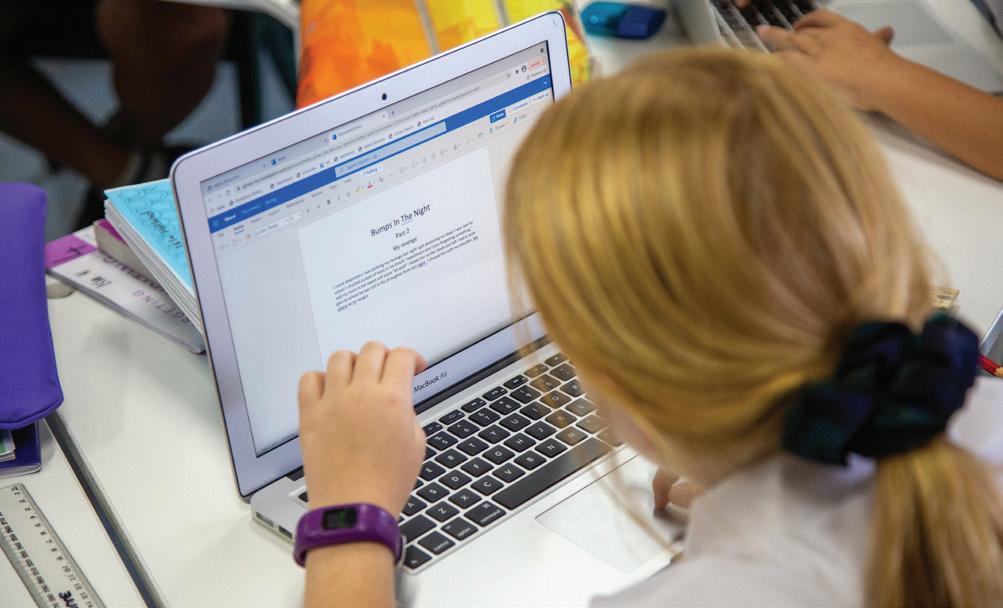
MATHEMATICS
Contact: Dr Amanda Draper
The Year 10 Mathematics course builds on the concepts, skills and performance developed in Year 9. The Year 10A and Year 10 Mathematics syllabus’ follow the Western Australian Curriculum. Assessments will include examinations, topic tests and problem solving investigations. Learning programs are differentiated to cater for student needs. Mathematics 10A are designed to lead to more advanced mathematics pathways in Year 11, including Mathematics Methods and Mathematics Specialist. This course also introduces the use of the Casio Classpad technology.
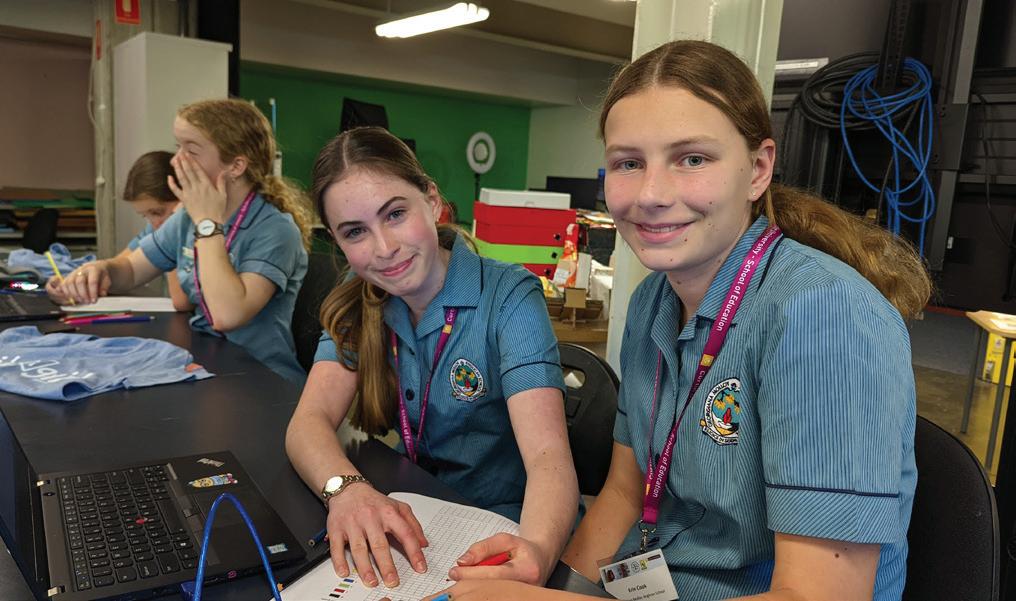
SCIENCE
Contact: Miss Leah Stone
Year 10 Science builds upon understandings taught in Year 9. Students are streamed based on their performance in the previous year. Students further develop their knowledge of chemistry, physics, genetics, biology and evolution. They develop questions, hypotheses and appropriate methods of investigation including field work and experimentation. Studies in this learning area can lead to a range of Science and Physical Education studies in Year 11.
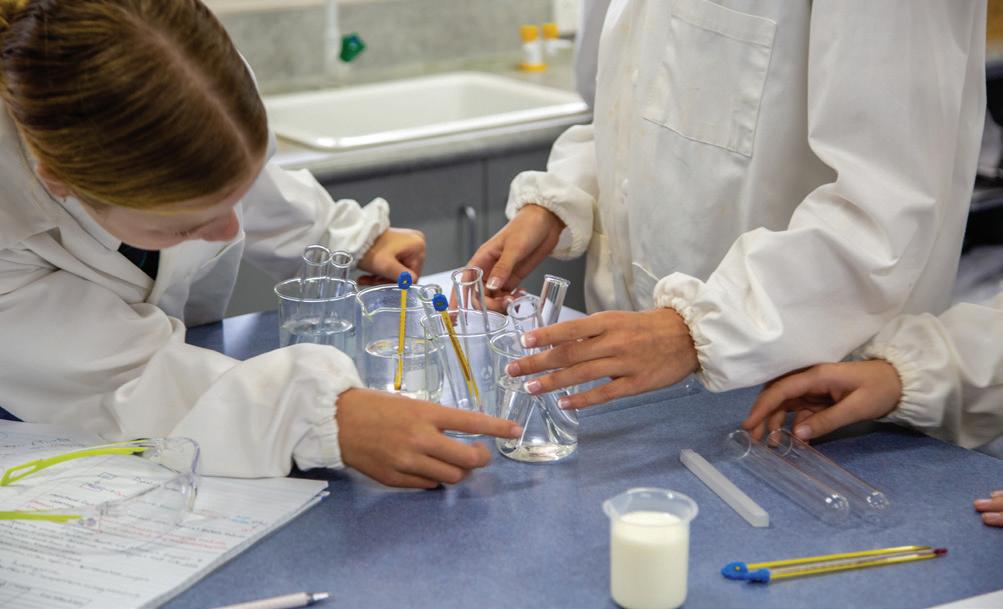
HUMANITIES &
SOCIAL SCIENCES
Contact: Ms Heather Fink
Humanities & Social Sciences (HASS) investigates people as social beings as they have existed and interacted with each other and the environment in time and place. It encompasses history, geography, economics, civics and citizenship. Studies in this learning area can lead to Geography, Modern History, Economics, Politics and Law pathways in Year 11.

P9
YEAR 10
COMPULSORY (CORE) COURSES
CHRISTIAN
RELIGIOUS STUDIES
Contact: Father Earle Chamberlain
Christian Religious Studies (CRS) provides experiences and opportunities for students to understand and appreciate the Bible, the story of the church, philosophy and beliefs, world religions, meditation, prayer and worship, ethical living and decision making. This course follows the Anglican Schools Commission (ASC) course program.
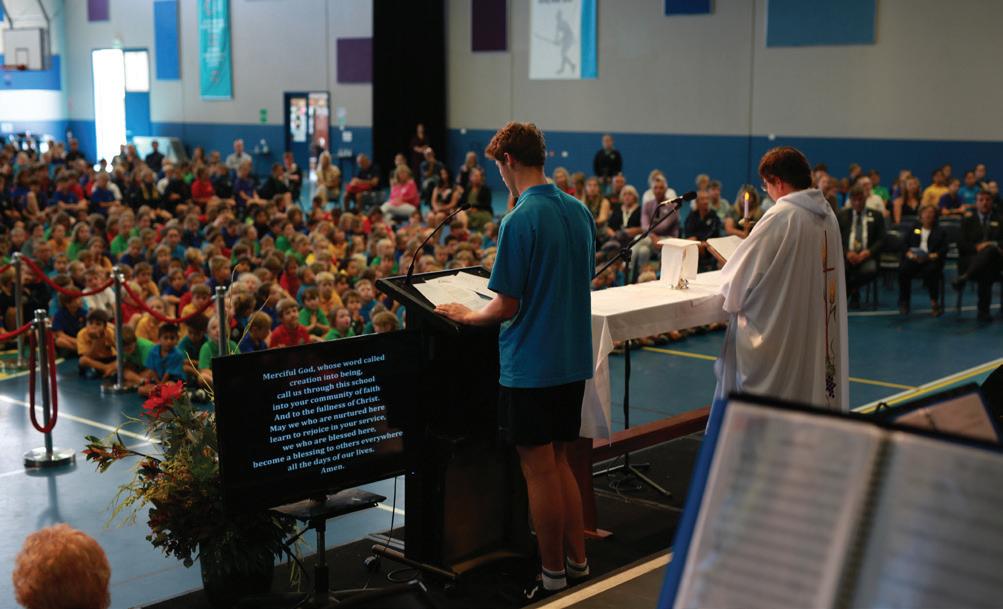
HEALTH EDUCATION
Contact: Mrs Robyn Vogel
In Year 10, students consider the reliability of online health information, respectful relationships and issues that affect the wider community. They study external influences on health decisions and evaluate their impact on personal identity and the health of the broader community. Students also take part in the Keys For Life road safety program which enables students to obtain their learner driver permits.


PHYSICAL EDUCATION
Contact: Mrs Robyn Vogel
Through utilisation of community resources, the Year 10 Physical Education course looks at exercise in the community and recreational activities rather than the standard competitive sports. Some of the activities the Year 10 students may be participating in is golf, boxing, aerobics, circuit workouts and bocce. Students are able to assume direct control of physical activites in coaching, coordinating and officiating roles. They explore motion, forces, leadership and teamwork.
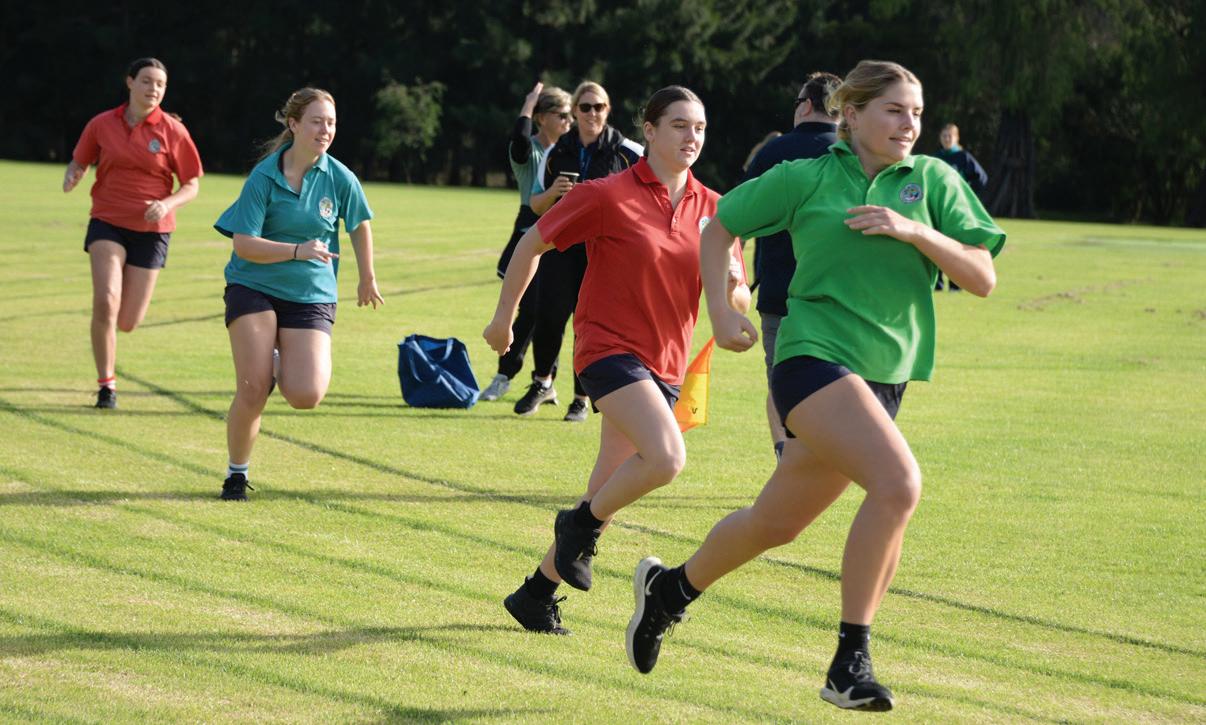
WORK STUDIES
Contact: Mrs Megan Grosse
The Work Studies course assists students in planning and shaping their future. Students are provided with the essential knowledge, understanding and skills needed for participating in a rapidly changing world of work. The Year 10 course follows six modules including self assessment, career options and goals, personal career strategy, financial literacy, work experience preparation (including a week long placement) and a digital marketing project/industry presentation.
P10
COMPULSORY (NON- CORE) COURSES
ADVANCED PHOTOGRAPHY
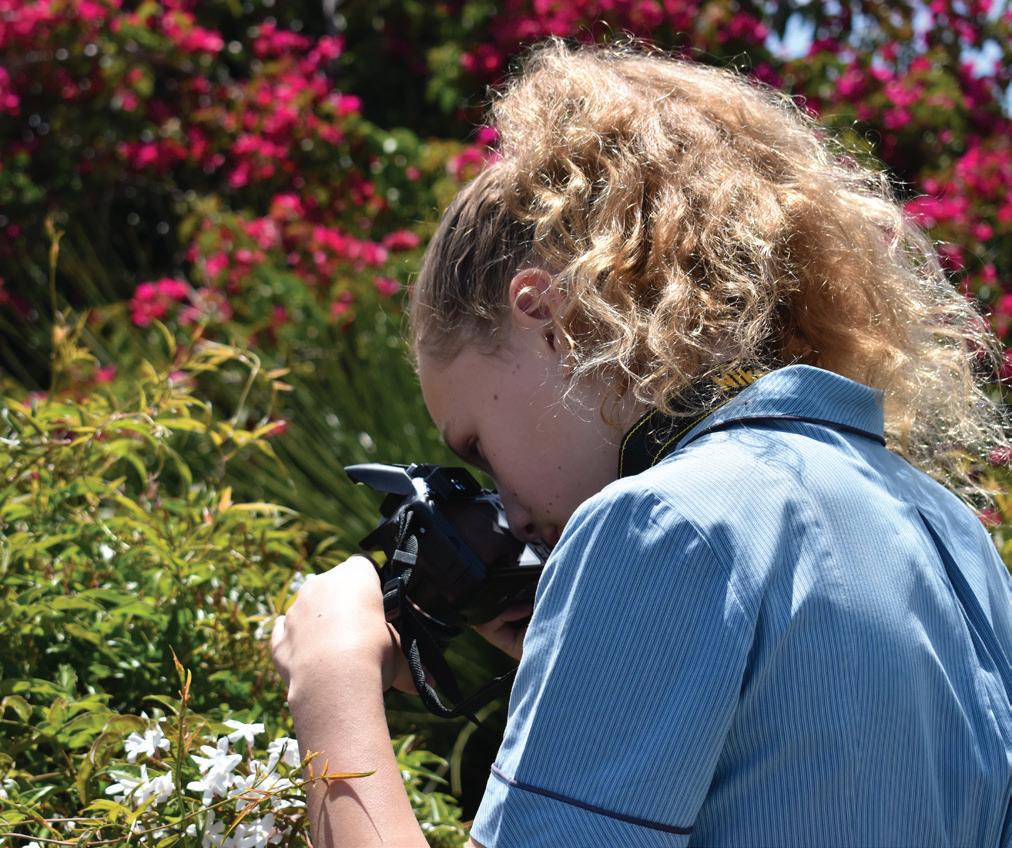
Learning Area: The Arts
Contact: Mr Phil Watts
Advanced Photography is a practical course for students who have studied the Introduction to Photography course in Year 9. Students will continue to develop knowledge of manual photography and will learn a vast range of photographic techniques. The course focuses on individualised topics, giving students the opportunity to explore how to manipulate shutter speed, aperture and ISO in creative situations. Students are tasked with becoming proficient in software programs as used in the creative industry, including Adobe Suite applications such as Photoshop and Lightroom.
*Pre-requisite:
BUILDING & CONSTRUCTION
Learning Area: Technology
Contact: Mr Steven Riddell
This course continues to develop students skills and understanding of working with a variety of materials and machining processes from Year 9. Students will continue to utilise basic hand and power tools to solve common problems and also create projects within the building and construction context. A thorough understanding of WA building laws and OH&S practises and considerations, which limit home development, will also be addressed.
Focus areas covered in the course are:
• the technology process – creating digital solutions that include investigating, designing, producing and evaluating their work
• practical skills and understanding of hand, power and fixed machines to produce models to a high standard of quality
This course is suitable for students with an interest in this area and those looking to pursue future studies and potential work in trades such as roofing, carpentry or general building.
This course leads directly to Year 11 General Building and Construction, Materials - Woodwork or Materials - Metals.
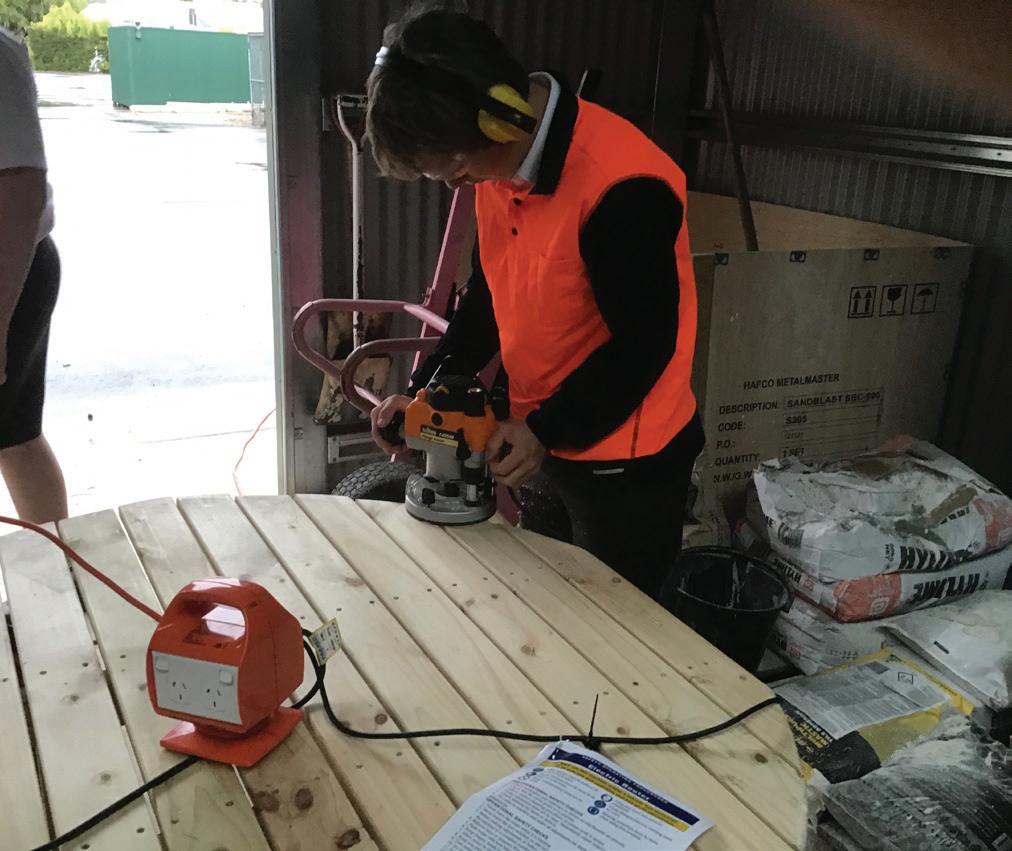
P11 ELECTIVE COURSES YEAR 10
Year 9 Photography
CERTIFICATE II IN MUSIC (VET)
Learning Area: The Arts
Contact: Mr Phil Watts
For the first time, GMAS is offering the Certificate II in Music vocational qualification for Year 10 Music students. In vocational courses, students learn and apply skills in ‘realistic’ workplace settings with assessments based within a ‘simulated’ workplace, business or company environment.
The Certificate II in Music is delivered through units of competency where students are tasked with learning knowledge and skills and then displaying what they learn to a competent standard. The units that make up the Certificate II in Music incorporate music performance, sound production, creation and composition, along with core units such as working effectively in the music industry. Job roles in the music industry are wide and ranging and include sound technicians, studio assistants, music management, musicians, composers, road crews and retail.
Students will have the opportunity to enrol in the Certificate III in Music course in Year 11 in 2024 which can be undertaken independently or in addition to the Year 11/12 ATAR Music course. It is strongly recommended that students complete the Certificate II in Music qualification in preparation for further Year 11 Music studies.

COMMUNITY & FAMILY STUDIES
Learning Area: Technology
Contact: Mr Steven Riddell
This course provides opportunities to develop in each student an understanding of the development, health and wellbeing of infants and children. Through emphasis on practical activities, students will explore the stages of child development from conception to school age that are of value for future working with children and parenting roles. It is a very rewarding and engaging course that has a broad appeal to students who have a future interest in working with children.
Focus areas covered in the course are:
• stages of child development from pregnancy, childbirth and key milestones
• the role the family plays in the development of young children
• the role of play in a child’s development
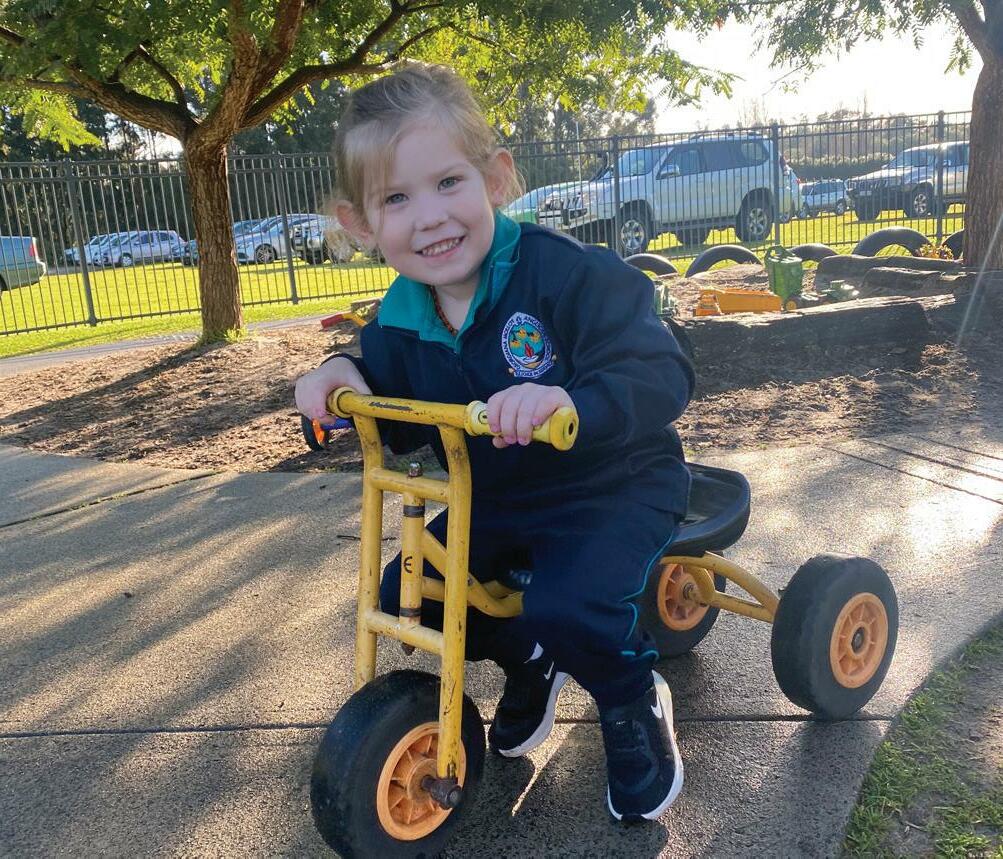
• early childhood education
• ways to care and work with children
This course leads directly to Year 11 General Children, Family and Community.
P12 ELECTIVE COURSES
DRAMA
TECHNOLOGY
DIGITAL Learning Area: Technology
Contact: Mr Steven Riddell
The Digital Technologies course in Year 10 allows students to build on their understanding and skills in the areas of emerging technologies, computational thinking, digital systems and critical and creative thinking. Students can expect to create both physical and digital projects, incorporating the use of robotics, embedded systems, electronics, programming and game development software. Students create solutions individually, collaboratively and interactively for sharing in online environments.
Focus areas covered in the course are:
• the technology process – creating digital solutions that include investigating, designing, producing and evaluating their works
• skill development in the areas of programming, computational thinking, game design, robotics and embedded systems
• explore informed and ethical decisions about the role, impact and use of technologies in the economy, environment and society for a sustainable future
This course leads directly to Year 11 Engineering Studies.

Learning Area: The Arts
Contact: Mr Phil Watts
Students will explore the elements of drama in this exciting, energetic, hands-on, performance-based course. They will develop their acting skills and techniques and work through the dramatic process of plan, practise, polish and perform, in individual and group activities. They will also be required to participate in at least two drama concerts throughout the year. Costuming, lighting, sound and make-up techniques are an integral part of the process. Finally, students will utilise a drama journal, where they apply critical reflection on their own and others’ dramatic processes. This course offers solid preparation for further Drama studies in Year 11 and 12. Students will explore theoretical apsects and the history of theatre. This course would suit students who can work together on projects and who are appreciative of all styles within this performing art.

P13 YEAR 10
ELECTIVE COURSES
FOOD TECHNOLOGY

INTRODUCTION TO ATAR PSYCHOLOGY

Learning Area: Technology
Contact: Mr Steven Riddell
This course encourages a fun, interactive and practical approach to the study of food and healthy eating. Students will design and create a wide range of foods, while developing an understanding of foods and healthy eating patterns. Students will gain the skills to safely create and produce a range of dishes and a variety of cuisines. There will be a focus on developing cooking techniques, understanding the properties of food, recognising the effects of processing and planning meals to ensure healthy eating habits. Students will explore Food Science and the changes that occur to food during cooking, processing, packaging and preserving. They will become knowledgeable in food selection, health, trends and international cuisine. Students will be able to develop their cooking skills while understanding the technology process of designing, planning and preparing food for a range of occasions.
Learning Area: Science
Contact: Miss Leah Stone
Students who are interested in studying psychology in Years 11 and 12 can now select Introduction to ATAR Psychology as an elective in Year 10 to begin building an understanding of how psychology helps to explain how we think, feel and behave. The Year 10 course will focus on human behaviour and relationships. Teachers can select from a range of contexts that tap into students’ interests and build on some of the informal understandings they may have already developed. Students will learn about the language of psychology and how human behaviour can be explored in relation to individuals, groups and society. They will be introduced to psychological research and access research through journal articles, audio visual material and the internet. The course will assist students to generate ideas and gain knowledge that will help them to become more confident, competent and independent in their everyday lives.
P14 ELECTIVE COURSES
JAPANESE
Learning Area: English & Languages
Contact: Ms Paisley Walker
Whether you love the ‘Kawaii culture’, anime or the ancient Samurai, this course should have something to interest you. Year 10 Japanese students will have the opportunity to build on their existing understanding of Japanese language and culture. They will build fluency in reading and writing Hiragana, learn Katakana and Kanji (two other Japanese alphabets), study various language topics and explore Japanese culture: origami, art, cooking and calligraphy. The course will also include a range of different study techniques that can be especially helpful when learning a foreign language. It will be useful for those hoping to travel to Japan in the future, either on a GMAS tour or with family. Australian universities, including UWA, have introduced a 10% bonus (on your scaled language mark, used to calculate your ATAR) for studying languages to a Year 12 level.

MATERIALS
TECHNOLOGY
Learning Area: Technology
Contact: Mr Steven Riddell
This course continues to develop students skills and understanding of working with a variety of materials and machining processes commonly used inside the home and is primarily a hands-on course. Students will have the opportunity to follow set plans to produce a range of challenging and innovative projects. The course introduces students to the manipulation of natural and man-made woods, using an expanding range of hand and power tools as well as industry standard CNC router and LASER engraver. Through the overarching emphasis on working safely in a workshop setting, students will also apply the technology process to investigate suitable materials for the projects, design parts of plans, and then produce and evaluate their designed solutions.
Focus areas covered in the course are:
• the technology process – creating digital solutions that include investigating, designing, producing and evaluating their work
• practical skills and understanding of hand, power and fixed machines to produce models to a high standard of quality
This course leads directly to Year 11 General Materials
– Woodwork, or General Building and Construction.

P15 YEAR 10
ELECTIVE COURSES
MEDIA STUDIES
Learning Area: The Arts
Contact: Mr Phil Watts
In Media Studies, students are exposed to many different forms of film and photography. Students develop the valuable tools necessary for success in further studies at senior schooling level, including the Media Production & Analysis course (ATAR or General). Students will learn how to communicate and express their own ideas through film. They will produce several individual short films and learn how to produce content that communicates effective messages. There will be a unit on photography skills, with some ‘tricks of the trade’ on how to manipulate and change camera settings to achieve amazing results. Several Adobe applications will be used, including Photoshop and Illustrator. Students also have the opportunity to expand their film language and written skills by analysing several noteworthy films. Media students reflect on and discuss their own creative work, intentions and outcomes. This course provides an essential foundation for students considering the Media Production & Analysis course in Years 11 and 12.

OUTDOOR EDUCATION
Learning Area: Health & Physical Education
Contact: Mrs Robyn Vogel
Outdoor Education is a course designed to meet the needs of students who exhibit an obvious interest in outdoor experiences, the environment and skill development. Outdoor Education in Year 10 offers an introductory course to those students interested in selecting an Outdoor Education course in Years 11 and 12. This course has both theoretical and practical components and is inclusive of, but not limited to: surf lifesaving, camp cooking, snorkelling and an expedition. The course aims to provide students with interesting and meaningful learning experiences to motivate students in their own outdoor pursuits and individual development. Some components covered in the course will include: bush navigation, planning an expedition, developing skills required in the outdoors such as canoeing, rock climbing and environmental relationships.
A levy of $500 applies to this course.

P16 ELECTIVE COURSES
SPORTS SCIENCE

VISUAL ARTS

Learning Area: The Arts
Contact: Mr Phil Watts
Learning Area: Health & Physical Education
Contact: Mrs Robyn Vogel
Advanced Physical Education is a course designed to meet the needs of students who exhibit an obvious interest in health and fitness, physical activity and sport. The focus of the course is an equal share of practical sporting activities and a theoretical component. Advanced Physical Education in Year 10 offers an introductory course to those students interested in selecting a Health & Physical Education course of study in Years 11 and 12. The course aims to provide students with interesting and meaningful learning experiences and a diverse range of physical activities to motivate students in their sporting pursuits. Four practical sport units (lasting one term each) are to be completed during the year and could be selected from a list such as: volleyball, squash, tennis, badminton, surf lifesaving, self-defence, circuit training, golf, archery and baseball.
A levy of $200 applies to this course.
The Visual Arts course encompasses both the practice and theory of the broad areas of art, craft and design. Students will be given opportunities to express their imagination by developing skills and personal imagery, through the engagement of making and presenting artworks. The course places value on uniqueness and individuality. It will assist students to value and develop confidence in their own creative abilities and to develop a greater understanding of their environment, community and culture. Innovation will be encouraged through a process of inquiry, exploration and experimentation; transforming and shaping ideas to develop resolved artworks. Students will engage in art-making processes in traditional and new media areas, which involve exploring, selecting and manipulating materials, techniques, processes, emerging technologies and responses to life. Students will gain knowledge, understanding and appreciation of art and culture, in both Australian and International contexts. Analysis and evaluation of their own works and the works of others will contribute to an appreciation of the role of art in the community and in daily life.
P17 YEAR 10 ELECTIVE COURSES
Year 11 & 12

Curriculum
The Year 11 and 12 curriculum offers students a wide range of courses that match their interests and skills while preparing them for further study, traineeships or the workforce. The majority of courses have minimum prerequistites that must be met in order to enrol in that course. This information is provided on the following pages. When selecting Senior School pathways, students are encouraged to talk through their options and goals with their teachers, Heads of Department, family and friends. A variety of resources are listed at the back of this handbook which students may find helpful in their decision making. GMAS offers parents and students the opportunity to attend information sessions and one-on-one course selection counselling to assist students in achieving their goals. As students mature and learn more about their career options, their chosen career path may well change. Course choices should be broad enough to allow for flexibility for their future education and training. It is our goal to support students through their final years of schooling, ensuring they continue to enjoy their learning journey while providing them with the experience and qualifications needed to pursue their ambitions after they leave school.


YEAR 11 & 12
Year 11 & 12 Course Offering
ATAR COURSES - LIST A
COURSE NAME PREREQUISITES
English English 60%
Literature
Japanese
Modern History
Economics
Year 10 English ‘B’ grade
Year 10 Japanese ‘B’ grade
Year 10 English ‘B’ grade, Year 10 HASS ‘B’ grade
Year 10 English ‘B’ grade, Year 10 HASS ‘B’ grade
Geography Year 10 English ‘B’ grade, Year 10 HASS ‘B’ grade
Music Year 10 English ‘C’ grade
Media Production and Analysis
Year 10 English ‘C’ grade
Year 10 English ‘B’ grade Drama
Visual Art Year 10 English ‘B’ grade
ATAR COURSES - LIST B
COURSE NAME
Mathematics Specialist
Mathematics Methods
Mathematics Applications
PREREQUISITES
Year 10A Mathematics ‘B’ grade
Year 10A Mathematics ‘B’ grade
Year 10 Mathematics ‘C’ grade
Chemistry B in Science, B in Mathematics
Physics
Human Biology
Biology
Psychology
Physical Education Studies
Year 10 Science ‘B’ grade, B in Mathematics 10 Extension
Year 10 Science ‘B’ grade
Year 10 Science ‘B’ grade
Year 10 English ‘C’ grade, Year 10 Science ‘B’ grade
Year 10 English ‘C’ grade, Year 10 Science ‘B’ grade
P20
GENERAL COURSES - LIST A
COURSE NAME PREREQUISITES
English
Accounting and Finance
Business Management and Enterprise
Children, Family and Community
Music
Media Production and Analysis
Visual Art
GENERAL COURSES - LIST B
COURSE NAME
Mathematics Essential
Outdoor Education
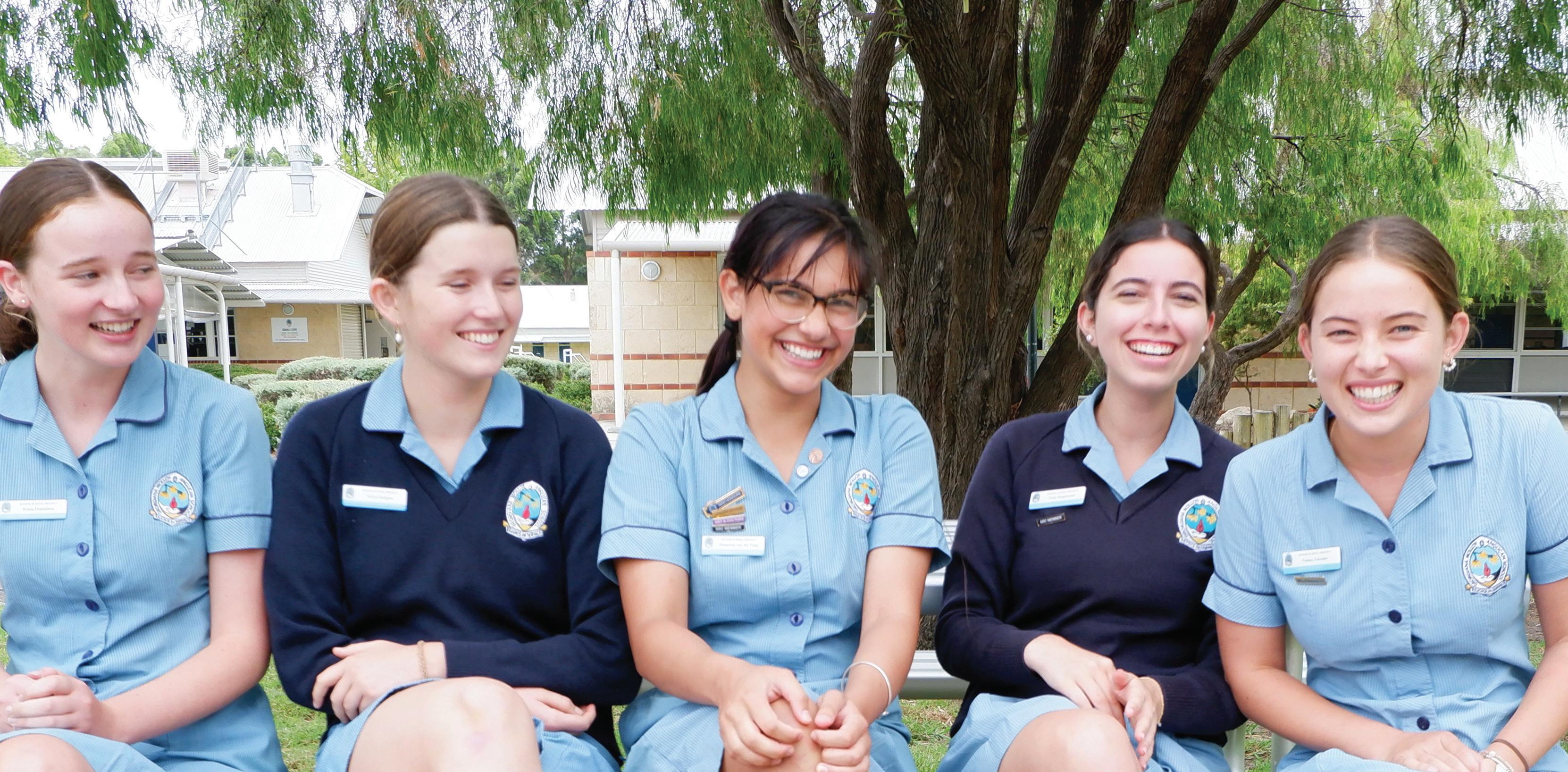
Physical Education
Materials Design Technology
Building and Construction
Food Science Technology
Human Biology
Engineering
A minimum Year 10 English ‘C’ grade is recommended
A minimum Year 10 English ‘C’ grade is recommended
A minimum Year 10 English ‘C’ grade is recommended
A minimum Year 10 English ‘C’ grade is recommended
A minimum Year 10 English ‘C’ grade is recommended
A minimum Year 10 English ‘C’ grade is recommended
A minimum Year 10 English ‘C’ grade is recommended
PREREQUISITES
A minimum Year 10 English ‘C’ grade is recommended
A minimum Year 10 English ‘C’ grade is recommended
A minimum Year 10 English ‘C’ grade is recommended
A minimum Year 10 English ‘C’ grade is recommended
A minimum Year 10 English ‘C’ grade is recommended
A minimum Year 10 English ‘C’ grade is recommended
A minimum Year 10 English ‘C’ grade is recommended
A minimum Year 10 English ‘C’ grade is recommended
Note: We will always endeavour to deliver all courses in the handbook, however availability may change as a result of insufficient student selection numbers, staffing or changes to training packages.
P21
YEAR 11 & 12
COURSE NAME
Certificate II Workplace Skills 1 year
Certificate III Business (Year 12 or after Certificate II) 1-2 years
Certificate III Events/Tourism 2 years 55 hours
Certificate II Sport Coaching 1 year
Certificate III Sport and Recreation (Year 12 or after Cert. II SC) 1-2 years
CERTIFICATE COURSES - OFF CAMPUS
South Regional TAFE Busselton
COURSE NAME SCHEDULE WORK PLACEMENT
Certificate IV Preparation for Health and Nursing Studies
Terms 1-4, Thursday/Friday
Certificate II Applied Digital Technologies Terms 1-3, Thursday/Friday
Certificate II Horticulture Terms 1-3, Thursday/Friday
Certificate III Education Support Terms 1-3, TBC 100 hours
Certificate III Business Terms 1-3, Thursday/Friday
Certificate III Accounts Administration Terms 1-3, Thursday/Friday
South Regional TAFE Bunbury
COURSE NAME SCHEDULE WORK PLACEMENT
Certificate II Conservation and Land Management
Terms 1-3, Thursday/Friday
Certificate II Sport and Recreation Terms 1-3, Thursday/Friday
Certificate II Retail Cosmetics Terms 1-3, Thursday/Friday
Certificate II Workplace Skills Terms 1-2, Thursday/Friday
Certificate II Salon Assistant Terms 1-2, Thursday/Friday
Certificate II Tourism Terms 1-2, Thursday/Friday
Certificate III Accounts Administration Terms 1-3, Thursday/Friday
Certificate II Applied Digital Technologies Terms 1-3, Thursday/Friday
Certificate II Hospitality Terms 1-2, Thursday/Friday
Certificate II Retail Services
Year 11 Only
Terms 1-2, Thursday/Friday 63 hours
Certificate II Horticulture Terms 1-3, Thursday/Friday
Pre-Apprenticeship Servicing Technology (Light Vehicle Servicing)
Pre-Apprenticeship Servicing Technology (Heavy Vehicle Servicing)
Pre-Apprenticeship Commercial Cookery (Kitchen Operations)
Pre-Apprenticeship Building & Construction (Carpentry & Joinery)
Pre-Apprenticeship Building & Construction (Bricklaying & Blocklaying)
Pre-Apprenticeship Building & Construction (Painting & Decorating)
Pre-Apprenticeship Electrotechnology (Career Start)
South Regional TAFE Margaret River
COURSE NAME
Certificate IV Preparation for Health and Nursing Studies
Certificate II Kitchen Operations (Pre-apprenticeship)
Certificate II Community Services
Certificate II Hospitality
Terms 1-4, Thursday/Friday 183 hours
Terms 1-4, Thursday/Friday 183 hours
Terms 1-3, Thursday/Friday
Terms 1-3, Thursday/Friday 220 hours
Terms 1-3, Thursday/Friday 220 hours
Terms 1-3, Thursday/Friday 125 hours
Terms 1-3, Thursday/Friday 157 hours
Terms 1-4, Monday
Terms 1-3, Monday 163 hours
Terms 1-3, Monday 100 hours
Terms 1-3, Thursday
Certificate II Music Industry Terms 1-3, Monday
P22
DURATION WORK PLACEMENT
CERTIFICATE COURSES - ON CAMPUS
* Some courses may attract a fee. This will be finalised on enrolment with Registered Training Organisations.
SCHEDULE WORK PLACEMENT
Bunbury Regional Trade Training Centre - Bunbury Catholic College
COURSE NAME
Certificate II Engineering Pathways
SCHEDULE
Terms 1-3, Thursday/Friday
WORK PLACEMENT COST
Certificate II Plumbing (Scholarship) 2 years Terms 1-6, Thursday 220 hours
Certificate III Education Support
$2,620
Fully funded
Terms 1-3, Tuesday 100 hours Approx $1,050
Certificate IV Education Support (Year 12 only) Terms 1-3, Monday 100 hours Approx $1,450
Certificate III Animal Care Services Terms 1-3, Wednesday Approx $2000
Certificate III Fitness
Terms 1-3 TBC Approx $2000
Certificate III Retail Terms 1-2, Friday Approx $1,820
Bunbury Regional Trade Training Centre - Eaton Community College
COURSE NAME SCHEDULE
Certificate II Automotive Servicing Technology
WORK PLACEMENT COST
Terms 1-3, Monday/Tuesday 100 hours Approx $3,070
Certificate II Automotive Electrical Technology Terms 1-3, Thursday/Friday 100 hours Approx $3,570
Certificate II Electrotechnology (Career Start) Terms 1-4, Thursday/Friday 162 hours Approx $3,920
Certificate III Aviation (Remote Pilot) Terms 1-3, Wednesday Approx $2,320
Certificate II Electronics Terms 1-3, Thursday Approx $3,920
Certificate II Building & Construction (Trades Pathway) Terms 1-4, Thursday 220 hours Scholarship
Bunbury Regional Trade Training Centre - Manea Senior College
COURSE NAME SCHEDULE WORK PLACEMENT COST
Certificate II Medical Service First Response Terms 1-3, Thursday Approx $1,800
Certificate III Business Semester 1, Wednesday
Certificate III Community Services Terms 1-3, Thursday 120 hours Approx $1,770
Certificate III Health Services Assistance Terms 1-3, Friday Approx $2,720
Certificate III Early Childhood Education and Care Terms 1-3, Tuesday 120 hours Approx $1,865
Certificate IV Dental Assisting (Year 11) 2 years Terms 1-4, Thursday/Friday 250 hours Approx $4,842
Certificate IV Community Services Terms 1-3, Monday Approx $1,770 Certificate IV Preparation for Health & Nursing Studies Terms 1-3, Tuesday Approx $2,800
Certificate IV Business Terms 1-3, Thursday Approx $2,170
SHORT COURSES - ON CAMPUS
COURSE NAME
School Based
COURSE NAME
Certificate
Certificate
Certificate
and Traineeships
P23
III Business Certificate II/III Financial Services
II Information, Digital Media and Technology Certificate I/II/III Retail Services
II/III Tourism Certificate II/III Hospitality
DURATION COST Barista Training 10 hours $90 Construction Industry White Card Online Approx $40 HLTAID003 Provide First Aid 1 day Approx $145
Note: BRTTC course fees are set by BRTTC and are separate to GMAS fees. Prices are indicative only. Students undertaking these courses receive discounted tuition at GMAS. YEAR 11 & 12
Apprenticeship
Note: We will always endeavour to deliver all courses in the handbook, however availability may change as a result of insufficient student selection numbers, staffing or changes to training packages.
EssentialInformation
What is WASSA?
All students who complete Year 12 receive a Western Australian Statement of Student Achievement (WASSA), regardless of their chosen pathway. The WASSA formally records a student’s achievement in every course, qualification and program undertaken in Years 11 and 12. WASSA is different to WACE.
What is WACE?
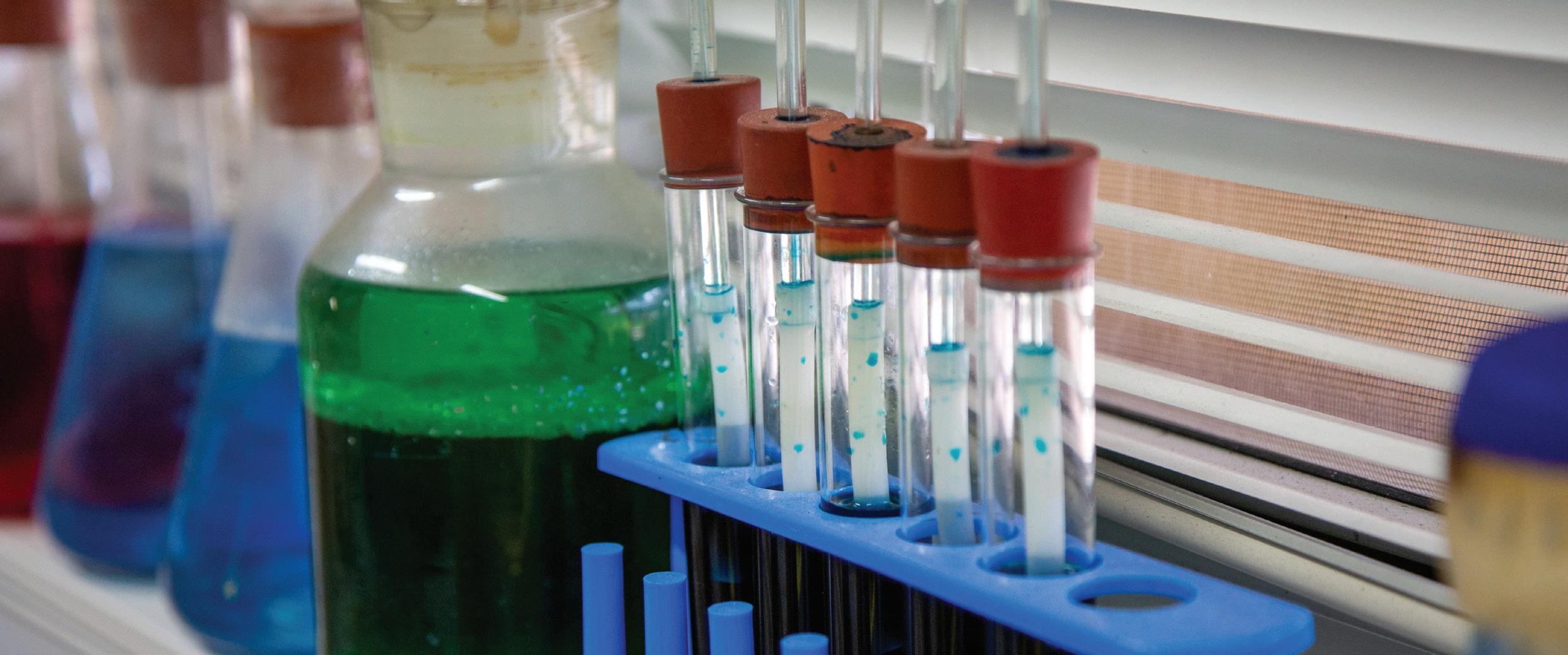
The Western Australian Certificate of Education (WACE) is a certificate awarded to Secondary School students who achieve the requirements outlined below. WACE is recognised by universities, industry, TAFE and other training providers and is a requirement for school leaver entry into university.
Meeting the Requirements
The WACE requirements page on the Authority website (https://senior-secondary.scsa.wa.edu.au/the-wace/ wace-requirements) has full details of what students need to do to achieve a WACE in 2023. The page also includes information about study options, sample programs and frequently asked questions (FAQs). The WACE Checker can help students track their eligibility. (https://wacechecker.scsa.wa.edu.au). Students should contact their school if they have concerns about their enrolment.
Useful Information
WACE
Year
Manual http://senior-secondary.scsa.wa.edu.au/further-resources/wace-manual
12 Information Handbook http://senior-secondary.scsa.wa.edu.au/further-resources/year-12-information Literacy and numeracy standard
1
General Requirements
You must:
• demonstrate a minimum standard of literacy (reading and writing) and a minimum standard of numeracy
• complete a minimum of 20 units, or equivalents
• complete
• at least four Year 12 ATAR courses OR
• at least five Year 12 General courses and/or ATAR courses or equivalent OR
• a Certificate II (or higher) VET qualification in combination with ATAR, General or Foundation courses
Literacy and Numeracy Standard
For the WACE literacy and numeracy standard you may:
2
• pre-qualify through achieving Band 8 or higher in the reading, writing and numeracy tests of the Year 9 National Assessment Program – Literacy and Numeracy (NAPLAN), OR
• demonstrate the minimum standard of literacy and numeracy by successfully completing the relevant components of the Online Literacy and Numeracy Assessment (OLNA) in Year 10, 11 or 12
3 Breadth and Depth
You must complete a minimum of 20 units, which may include unit equivalents attained through VET and/or endorsed programs. This requirement must include at least:
• a minimum of ten Year 12 units, or the equivalent
• four units from an English course, post-Year 10, including at least one pair of Year 12 units from an English learning area course
• one pair of Year 12 units from each of List A (arts/languages/social sciences) and List B (mathematics/science/technology) subjects
4 Achievement Standard
You must achieve at least 14 C grades or higher (or equivalents) in Year 11 and Year 12 units, including at least six C grades (or equivalents) in Year 12 units.
5 Unit Equivalent
Unit equivalents can be obtained through VET qualifications and/or endorsed programs. The maximum number of unit equivalents available through VET and endorsed programs is four Year 11 units and four Year 12 units with a maximum of four units with endorsed programs – two in Year 11 and two in Year 12.
P25 2023 WACE REQUIREMENTS
YEAR 11 & 12
Academic pathways
What is ATAR?
The Australian Tertiary Admissions Rank (ATAR) is a number between 0.00 and 99.95 that reports the rank position of a student relative to all other students. If you have an ATAR of 70.00, for example, it indicates that you’ve achieved as well as or better than 70% of the Year 12 school leaver age population in the state. The ATAR allows the results of any WA student applying for university admission interstate to be directly compared with results in other states.
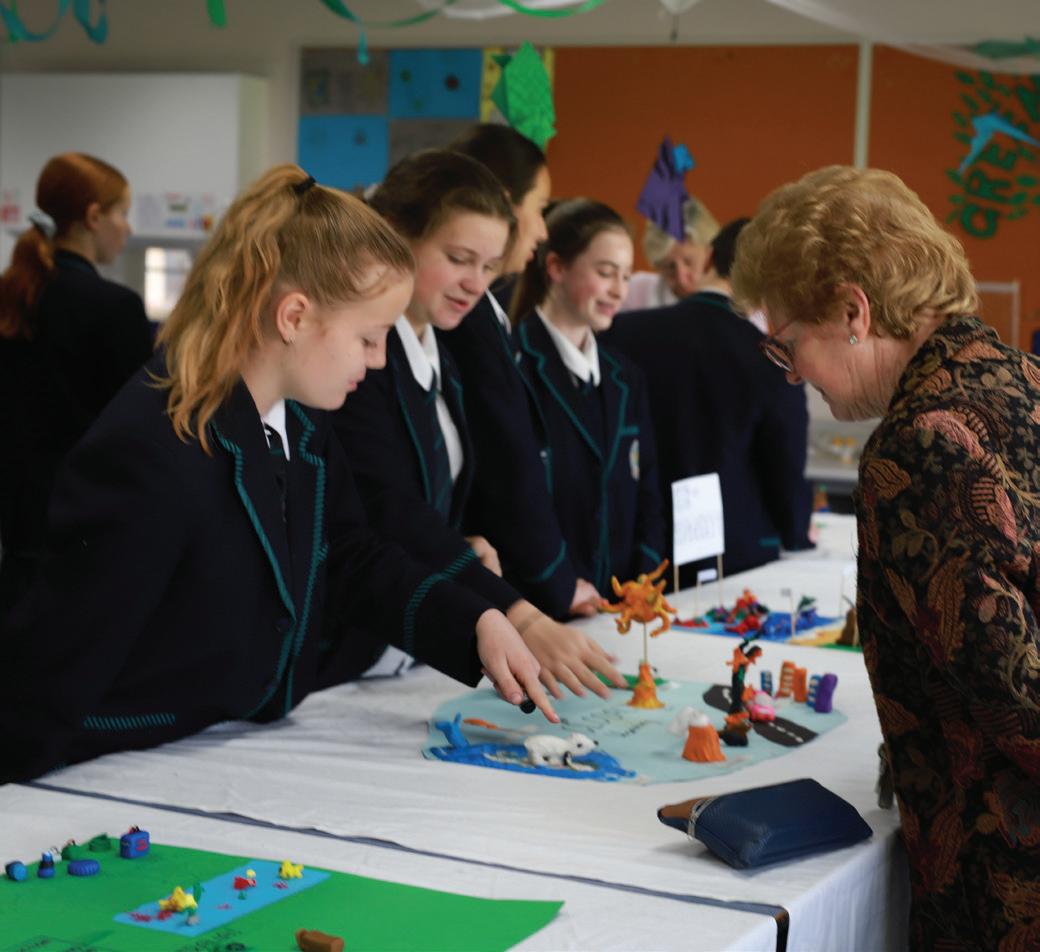
ATAR Courses
ATAR courses are for students who are aiming to go straight to university. These courses are set by the School Curriculum and Standards Authority (SCSA) and are examined externally. Student results in ATAR courses are used to calculate a student’s ATAR.
Study Requirements
• At least one course must be selected from both List A and List B, with a total of six courses including English
• A minimum of four Year 12 ATAR courses must be selected
• ATAR courses require a minimum of a ‘C’ grade in Year 10 English as a base prerequisite
Selecting an ATAR Course Pathway
• Choose six courses from those listed in this handbook
• Alternatively, choose five courses plus a study period if undertaking a Certificate III or higher or an off-campus qualification
• Ensure that you meet the prerequisites of selected courses (listed under each course descriptor)
University Admission
In addition to achieving the WACE, school leaver admission is based upon the student’s ATAR, competence in English, and (in some cases), completion of prerequisite courses. The Tertiary Institutions Service Centre (TISC) is the ultimate authority on admission requirements for school leavers and their website (www.tisc.edu.au) provides detailed information. Alternative entry pathways are available through our VET offerings.
28
General Courses
General courses are for students who are typically aiming to enter further vocationally based training, the workforce, straight from school or an alternative pathway to university. General courses do not contribute to a student’s ATAR but do contribute towards the WACE and TAFE entry.

Study Requirements
• At least one course must be selected from both List A and List B, with a total of six courses including English
• A minimum of five Year 12 General courses must be selected.
• It is recommended that students achieve a minimum of a ‘C’ grade in Year 10 English

• Ensure that you meet any required prerequisites for the desired courses (listed under each course descriptor)
Select a Course Pathway
• Choose six courses from those listed in this handbook
• Alternatively, choose five courses plus a study period if undertaking an off-campus qualification or an all day certificate on-campus
Alternative Entry
Each university has a number of alternative entry pathways that provide students with options if their ATAR results or Senior School pathways do not provide immediate eligibility for direct entry to undergraduate study. More specific and current information can be found at tisc.edu.au.
YEAR 11 & 12
The Arts
DRAMA MEDIA PRODUCTION
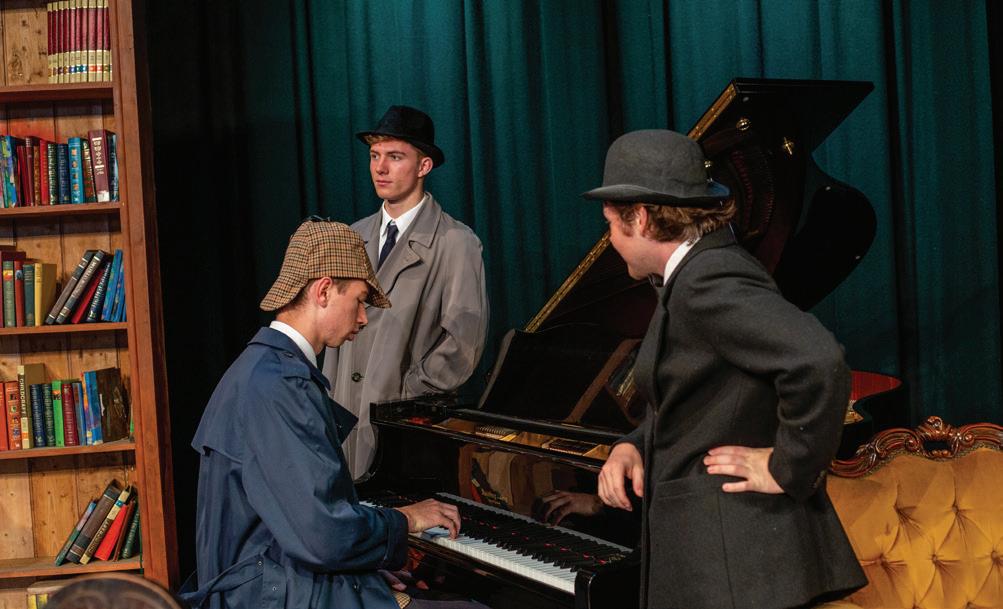
ATAR
Subject code: DRA
List: A

Year 11 Prerequisite: Year 10 English ‘C’ grade
Contact: Mr Phil Watts
ATAR Drama facilitates the achievement of four outcomes: drama ideas, drama skills and processes, drama responses and drama in society. Students engage in drama processes such as improvisation, play building, text interpretation, playwriting and dramaturgy. This allows them to create original drama and interpret a range of texts written or devised by others by adapting the theoretical approaches of drama practitioners like Stanislavski and Brecht. Students’ work in this course includes production and design aspects involving directing, scenography, costumes, props, promotional materials, and sound and lighting. New technologies are utilised, including digital sound and multimedia. The focus in this course is on individual and ensemble performance, as well as the roles of actor, director, scenographer, lighting designer, sound designer, costume designer and dramaturge.
& ANALYSIS
ATAR
Subject code: MPA
List: A
Year 11 Prerequisite: Year 10 English ‘B’ grade
Contact: Mr Phil Watts
This course aims to prepare all students for a future in a digital and interconnected world by providing the skills, knowledge and understanding to tell their own stories and interpret others’ stories. Students interaction and opportunity to use technologies enables them to engage with current media and adapt to evolving media platforms. The production of media work enables students to demonstrate their understanding of the key concepts of media languages, representation, audience, production, skills and processes as well as express their creativity and originality. When producing media work, students learn to make decisions about all aspects of production, including creative choices across preproduction, production and post-production phases, enabling students to manipulate technologies which simulate industry experiences.
P28
MUSICMEDIA PRODUCTION
& ANALYSIS
General
Subject code: MPA
List: A
Recommended: Year 10 English ‘C’ grade
Contact: Mr Phil Watts
General Media Production students will have the opportunity to work with modern technologies, such as HD film camera equipment and green screens. The General Media Production course aims to prepare all students for a future in a digital and interconnected world by providing the skills, knowledge and understandings to tell their own stories and interpret others’ stories. Students will explore the areas of mass media and independent media including blockbuster films, TV and magazines and have the opportunity to plan and produce their very own short film, blog and zine.
ATAR
Subject code: MUS
List: A
Year 11 Prerequisite: Year 10 English ‘C’ grade
Contact: Mr Phil Watts
ATAR Music encourages students to explore a range of musical experiences aimed at developing their musical skills, understanding, and creative potential through the context of contemporary music. The course consists of a 50% written component and a 50% practical component. The practical component can be delivered in a different context and is independent of the written component. Students can choose to perform on an instrument or voice. Students are provided with opportunities for creative expression and the development of aesthetic appreciation and respect for music and music practices across different times, places, cultures and contexts. Students listen, compose, perform and analyse music, developing skills to confidently engage with a diverse array of musical experiences. This course can provide a pathway for further training and employment within the music industry.
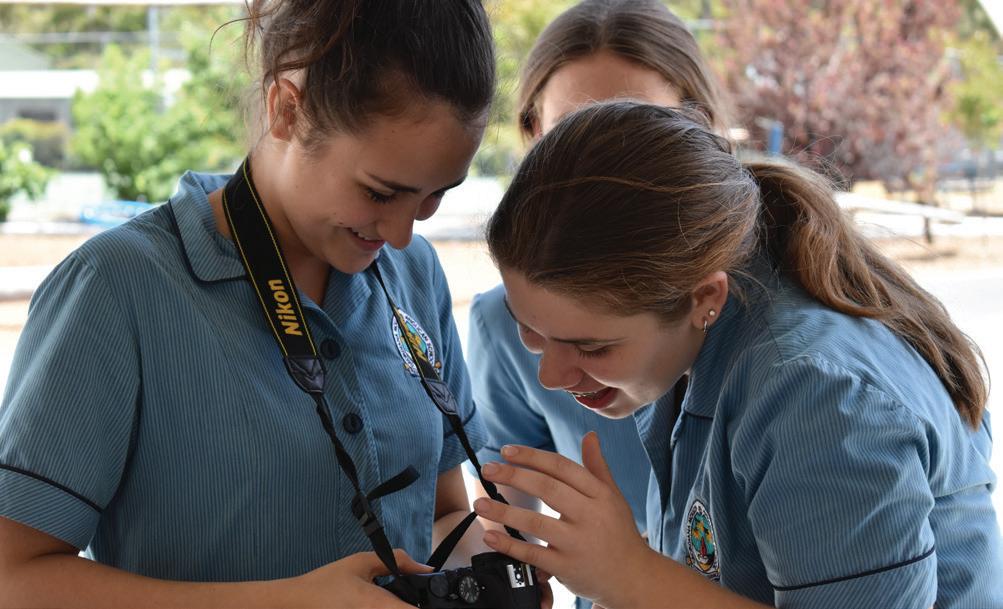

P29
YEAR 11 & 12
MUSIC
General
Subject code: MUS
List: A
Recommended: Year 10 English ‘C’ grade
Contact: Mr Phil Watts
Students listen to, compose, perform and analyse music, developing skills to confidently engage with a diverse array of musical experiences, both independently and collaboratively. Studying music may also provide a pathway for further training and employment in a range of professions within the music industry. The Music General course syllabus is designed around the same four key outcomes as the Music ATAR course. The course consists of a written component and a practical component. The written component incorporates ‘aural and theory’, ‘composition and arrangement’, and ‘investigation and analysis’. The practical component is independent of the written component and requires individual tuition from an instrumental teacher.
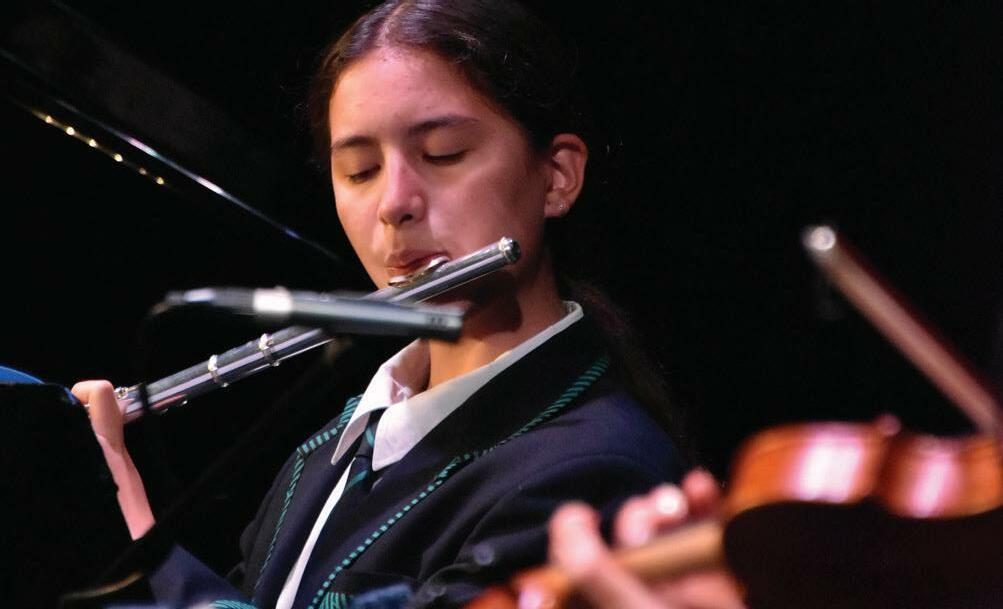
VISUAL ARTS

ATAR
Subject code: VAR
List: A
Year 11 Prerequisite: Year 10 English ‘B’ grade
Contact: Mr Phil Watts
This course enables students to engage in traditional, modern and contemporary media and techniques within the broad areas of art forms. The course promotes innovative practice. Students are encouraged to explore and represent their ideas and gain an awareness of the role that artists and designers play in reflecting, challenging and shaping societal values. The Visual Arts ATAR Course allows students to develop aesthetic understandings and a critical awareness to appreciate and make informed evaluations of art through their engagement of their own art practice and the work of others.
P30
VISUAL ARTS

General
Subject code: VAR
List: A
Recommended: Year 10 English ‘C’ grade

Contact: Mr Phil Watts
The Visual Arts General course aims to enable students to make connections to relevant fields of study and to generally prepare them for creative thinking and problem-solving in future work and life. It aims to contribute to a sense of enjoyment, engagement and fulfilment in their everyday lives, as well as to promote an appreciation for the environment and ecological sustainability.
YEAR 11 & 12
English & Languages
ENGLISH ENGLISH
ATAR
Subject code: ENG
List: A Year 11 Prerequisite: Year 10 English ‘C’ grade

Contact: Ms Paisley Walker
In this course, students study language through the use of written, visual and oral communication texts. Through the study of these texts, students learn about the English language, how it works and how to use it effectively. Students learn the conventions of English language to communicate ideas, feelings and attitudes and interact with others; to cope with increasingly complex communication demands; to explore and develop ideas, and access an increasing range of knowledge and ways of thinking.
General Subject code: ENG
List: A
Recommended: Year 10 English ‘C’ grade

Contact: Ms Paisley Walker
The English General course focuses on consolidating and refining the skills and knowledge needed by students to become competent, confident and engaged users of English in everyday, community, social, further education, training and workplace contexts. The course develops students’ language, literacy and literary skills to enable them to communicate successfully both orally and in writing and to enjoy and value using language for both imaginative and practical purposes. Unit 1 focuses on students comprehending and responding to the ideas and information presented in texts. Unit 2 focuses on interpreting ideas and arguments in a range of texts and contexts.
P32
LITERATUREJAPANESE
ATAR
Subject code: JSL
List: A
Year 11 Prerequisite: Year 10 English ‘C’ grade, Year 10 Japanese ‘C’ grade
Contact: Ms Paisley Walker
This course progresses from the Year 7–10 curriculum, and focuses on further developing a student’s knowledge and understanding of the culture and the language of Japanese-speaking communities.
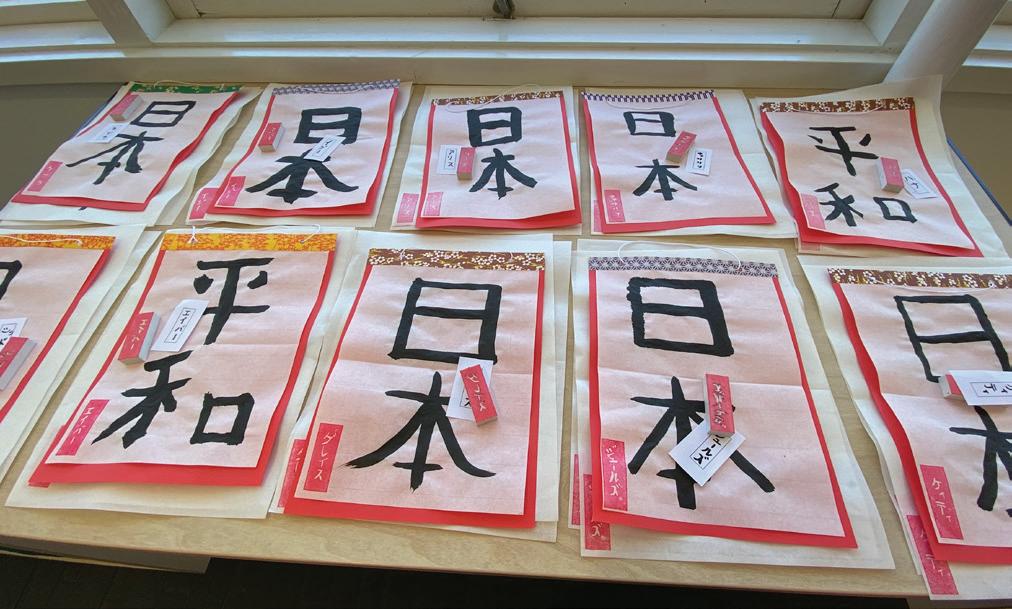
Students gain a broader and deeper understanding of the Japanese language and extend and refine their communication skills. The Japanese: Second Language ATAR course can connect to the world of work, further study and travel. It also offers opportunities for students to participate in the many sister school and student exchange programs between Western Australia and Japan. It is designed to equip students with the skills needed to function in an increasingly globalised society, a culturally and linguistically diverse local community, and to provide the foundation for life-long language learning.
ATAR
Subject code: LIT
List: A

Year 11 Prerequisite: Year 10 English ‘B’ grade
Contact: Ms Paisley Walker
The Literature ATAR course focuses on the study of literary texts and developing students as independent, innovative and creative learners and thinkers who appreciate the aesthetic use of language; evaluate perspectives and evidence; and challenge ideas and interpretations. The Literature ATAR course explores how literary texts construct representations, shape perceptions of the world and enable us to enter other worlds of the imagination. In this subject, students actively participate in the dialogue of literary analysis and the creation of imaginative and analytical texts in a range of modes, media and forms. Students respond creatively and critically to literary texts drawn from the past and present and from Australian and other cultures. They reflect on what these texts offer them as individuals, as members of Australian society and as world citizens.
P33
YEAR 11 & 12
Health & PhysicalEducation
OUTDOOR EDUCATION
General
Subject code: OED
List: B
Recommended: Year 10 English ‘C’ grade
Contact: Mrs Robyn Vogel
Outdoor Education aims to develop an understanding of our relationships with the environment, others and ourselves. The Outdoor Education General course focuses on outdoor activities such as canoeing, bushwalking, orienteering, bike riding and aquatics and provides students with an opportunity to develop essential life skills and physical activity skills. It also helps develop self-awareness by engaging in a range of challenging outdoor activities. It enhances personal and group skills, builds confidence, empathy and selfunderstanding. Students are expected to plan and participate in a range of outdoor activities and learn to assess risk and identify and apply appropriate management strategies and emergency response procedures.
A levy of $700 applies to this course for compulsory camps, excursions and training courses.
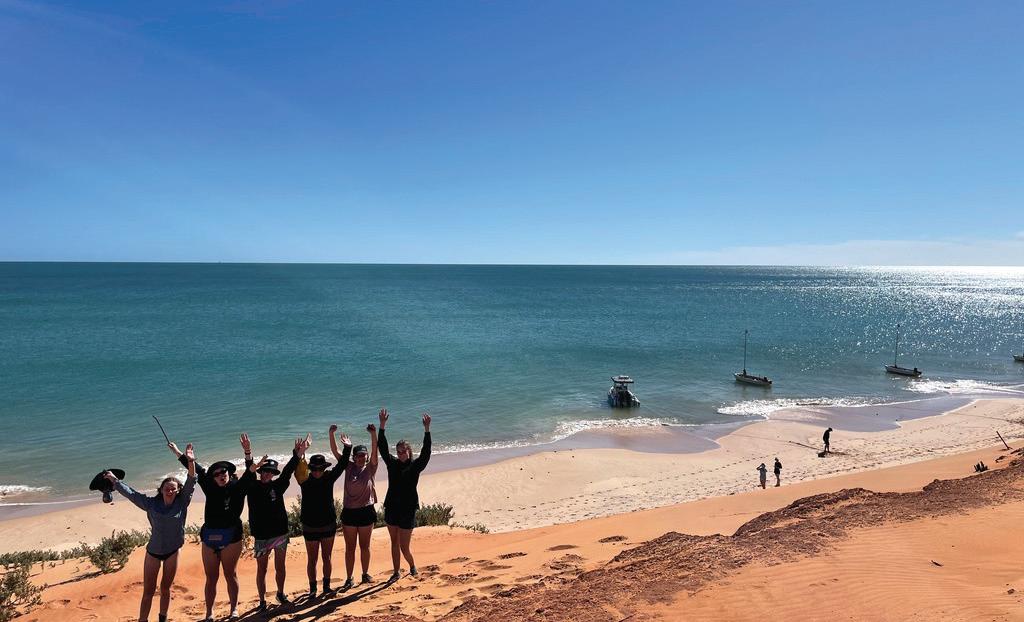
PHYSICAL EDUCATION STUDIES
ATAR
Subject code: PES
List: B
Year 11 Prerequisite: Year 10 English ‘C’ grade, Year 10 Science ‘B’ grade
Contact: Mrs Robyn Vogel
Physical Education Studies contributes to the development of students’ physical, social and emotional growth. In the Physical Education Studies ATAR course students learn about physiological, psychological and biomechanical principles and apply these to analyse and improve personal and group performances in physical activities. Throughout the course, students learn through integrated written, oral and active learning experiences. The course also provides students with opportunities to develop skills that will enable them to pursue personal interests and potential in physical activity as athletes, coaches, officials, administrators and/or volunteers.

P34
PHYSICAL EDUCATION STUDIES


General
Subject code: PES
List: B
Recommended: Year 10 English ‘C’ grade
Contact: Mrs Robyn Vogel
The Physical Education Studies General course provides students with opportunities to understand and improve performance through the integration of theoretical concepts and practical activities. Through engagement as performers, leaders, coaches, analysts and planners of physical activity, students may develop skills that can be utilised in leisure, recreation, education, sport development, youth work, health and medical fields.
Humanities & Social Sciences
BUSINESS MANAGEMENT & ENTERPRISE ATAR

GENERAL
Subject code: BME
List: A
Recommended: Year 10 English ‘C’ grade
Contact: Ms Heather Fink
The Business Management and Enterprise General course gives students the opportunity to understand how vital business is to individuals and society, and how it impacts on many aspects of our lives. Business has a complex and dynamic organisational structure that requires a combination of skills, aptitude, creativity, initiative and enterprise to operate effectively. In a constantly changing world, individuals, businesses and nations must adapt their position in an increasingly global economy and generate the wealth to sustain economic growth. This course focuses on the development of these skills within the business cycle, day-to-day running, continuing viability and expansion of a business. Exposure to a wide range of business activities, management strategies and an understanding of enterprise, helps students to appreciate the significance of their role as both participants and consumers in the business world.
Unit 1: Establishing a small business in Australia.
Unit 2: Operating a small business in Australia.
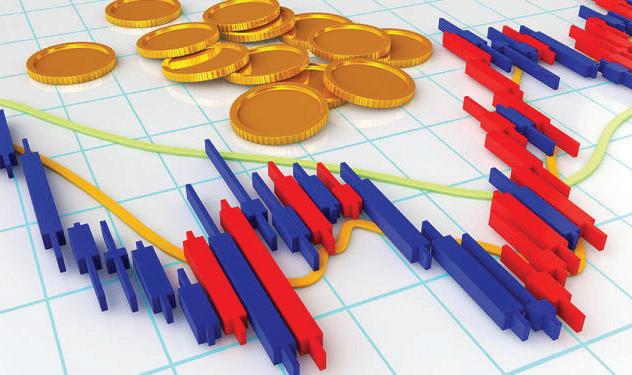
ECONOMICS
Subject code: ECO
List: A
Year 11 Prerequisite: Year 10 English ‘B’ grade, Year 10 HASS ‘B’ grade
Contact: Ms Heather Fink
The Economics ATAR course develops reasoning, logical thinking and interpretation skills demanded by the world of work, business and government. These skills relate to a variety of qualifications in vocational, technical and university education contexts. The learning experiences available through studying this course explore the knowledge, values and opinions which surround the complex range of economic events and issues facing our community, such as unemployment, income distribution, business strategy and international relations. Economic literacy developed through this course enables students to actively participate in economic and financial decisionmaking, which promotes individual and societal wealth and wellbeing.
P36
GEOGRAPHY
ATAR
Subject code: GEO
List: A
Year 11 Prerequisite: Year 10 English ‘B’ grade, Year 10 HASS ‘B’ grade
Contact: Ms Heather Fink
The study of Geography draws on students’ curiosity about the diversity of the world. It enables them to appreciate the complexity of our world and the diversity of its environments, economies and cultures and use this knowledge to promote a more sustainable way of life and awareness of social and spatial inequalities.
In the senior secondary years, the Geography ATAR course provides a structured, disciplinary framework to investigate and analyse a range of challenges and associated opportunities facing Australia and the global community.

MODERN HISTORY

ATAR
Subject code: HIM
List: A Year 11 Prerequisite: Year 10 English ‘B’ grade, Year 10 HASS ‘B’ grade
Contact: Ms Heather Fink
The Modern History ATAR course enables students to study the forces that have shaped today’s world and provides them with a broader and deeper comprehension of the world in which they live. While the focus is on the 20th century, the course refers back to formative changes from the late 18th century onwards and encourages students to make connections with the changing world of the 21st century. The themes that run through the units include: local, national and global conflicts and their resolution; the rise of nationalism and its consequences; the decline of imperialism and the process of decolonisation; the continuing struggle for the recognition of human rights; the transformation of social and economic life; the regional shifts in power and the rise of Asia; and the changing nature and influence of ideologies.
P37 YEAR 11 & 12
Mathematics
MATHEMATICS SPECIALIST
ATAR
Subject code: MAS
List: B
Year 11 Prerequisite: Year 10A Mathematics ‘B’ grade
Contact: Dr Amanda Draper
This course provides opportunities, beyond those presented in the Mathematics Methods ATAR course, to develop rigorous mathematical arguments and proofs, and to use mathematical models more extensively. Mathematics Specialist contains topics in functions and calculus that build on and deepen the ideas presented in the Mathematics Methods course, as well as demonstrate their application in many areas. The course also extends understanding and knowledge of statistics and introduces the topics of vectors, complex numbers and matrices. This is the only ATAR Mathematics course that cannot be taken as a stand-alone course and it must be studied in conjunction with the Mathematics Methods course as preparation for entry to specialised university courses such as Engineering, Physical Sciences and Mathematics. The pairing of Mathematics Methods ATAR and Mathematics Specialist ATAR can help to maximise ATAR in Year 12 for capable mathematics students. Ten percent of the scaled score for both Mathematics Methods and Mathematics Specialist is added to the TEA (used for calculating ATAR) regardless of whether these subjects are in the student’s top four.
MATHEMATICS METHODS
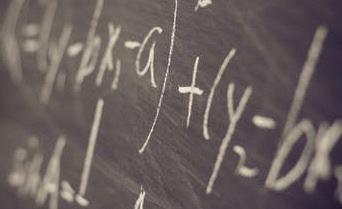
ATAR
Subject code: MAM
List: B
Year 11 Prerequisite: Year 10A Mathematics ‘B’ grade
Contact: Dr Amanda Draper
This course focuses on the use of calculus and statistical analysis; introducing new and exciting mathematical skills in addition to advancing the use of the Casio Classpad calculator. The study of calculus provides a basis for understanding rates of change in the physical world, and includes the use of functions, their derivatives and integrals, in modelling physical processes. The study of statistics develops students’ ability to describe and analyse phenomena that involve uncertainty and variation. Mathematics Methods provides a foundation for further studies in disciplines in which mathematics and statistics have important roles. It is also advantageous for further studies in the health and social sciences. In summary, this course is designed for students whose future pathways may involve mathematics and statistics and their applications in a range of technical disciplines at the tertiary level. It is recommended that capable mathematics students study Mathematics Methods ATAR in conjunction with Mathematics Specialist ATAR as this pairing can be beneficial to their ATAR in Year 12. Ten percent of the scaled score for Mathematics Methods is added to the TEA (used for calculating ATAR) regardless of whether this subject is in the student’s top four.

P38
MATHEMATICS APPLICATIONS MATHEMATICS ESSENTIAL
ATAR
Subject code: MAA
List: B
Year 11 Prerequisite: Year 10 Mathematics ‘C’ grade

Contact: Dr Amanda Draper
This course focuses on the use of mathematics to solve problems in contexts that involve financial modelling, geometric and trigonometric analysis, graphical and network analysis, and growth and decay in sequences. It both builds on, and adds to, concepts from Years 7 to 10, introducing new mathematical skills and the use of the Casio Classpad calculator. It also provides opportunities for students to develop systematic strategies based on the statistical investigation process for answering statistical questions that involve analysing univariate and bivariate data, including time series data. The Mathematics Applications ATAR course is designed for students who want to extend their mathematical skills beyond Year 10 level, but whose future studies or employment pathways do not require knowledge of calculus. The course is designed for students who have a wide range of educational and employment aspirations, including continuing their studies at university or TAFE.
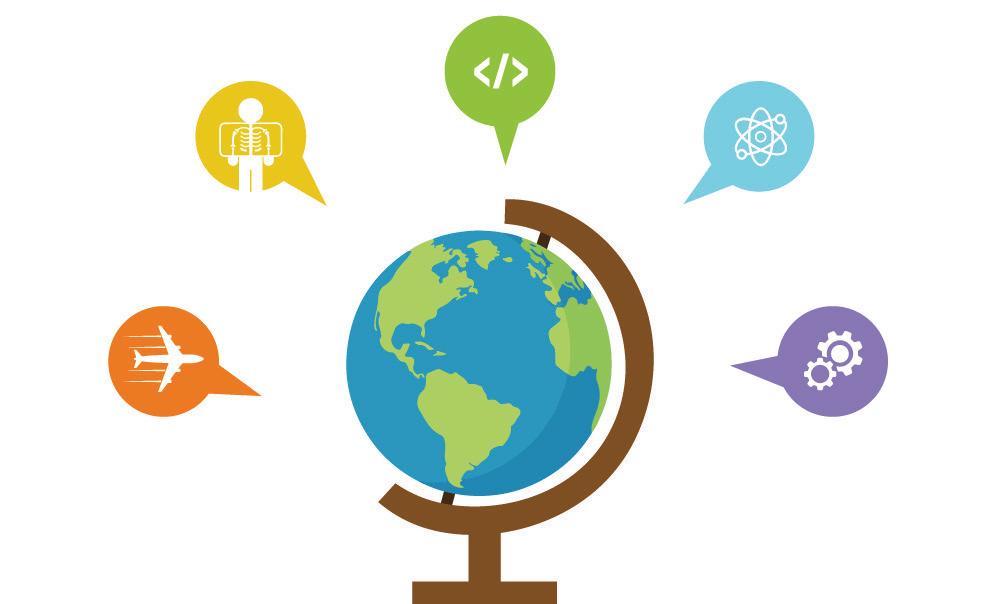
General
Subject code: MAE
List: B
Year 11 Prerequisite: No prerequisites required
Contact: Dr Amanda Draper
A course which focuses on using mathematics effectively, efficiently and critically to make informed decisions. It uses and builds on concepts from Years 7 to 10 to provide students with the mathematical knowledge, skills and understanding to solve problems in real contexts for a range of workplace, personal, further learning and community settings. This course provides the opportunity for students to prepare for post-school options of employment and further training. Students will have the opportunity to apply the mathematical thinking process to real-world problems.
P39
YEAR 11 & 12
Science
BIOLOGY
ATAR
Subject code: BLY
List: B
Year 11 Prerequisite: Year 10 Science ‘B’ grade
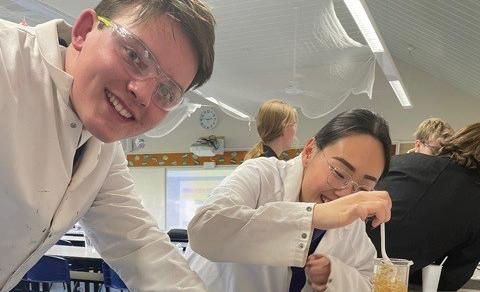
Contact: Miss Leah Stone
This course encourages students to be analytical, to participate in problem-solving and to systematically explore fascinating and intriguing aspects of living systems, from the microscopic level through to ecosystems. Students develop a range of practical skills and techniques through investigations and fieldwork in authentic contexts, such as marine reefs, endangered species, urban ecology, or biotechnology. Scientific evidence is used to make informed decisions about controversial issues. In Biology, students develop their understanding of biological systems, the components of these systems and their interactions, how matter flows and energy is transferred and transformed in these systems, and the ways in which these systems are affected by change at different spatial and temporal scales.
CHEMISTRY
ATAR
Subject code: CHE
List: B
Year 11 Prerequisite: Year 10 Science ‘B’ grade, Mathematics 10 Extension ‘B’ grade
Contact: Miss Leah Stone
The Chemistry ATAR course equips students with the knowledge, understanding and opportunity to investigate properties and reactions of materials. Theories and models are used to describe, explain and make predictions about chemical systems, structures and properties. Students recognise hazards and make informed, balanced decisions about chemical use and sustainable resource management. Investigations and laboratory activities develop an appreciation of the need for precision, critical analysis and informed decision making. This course prepares students to be responsible and efficient users of specialised chemical products and processes at home or in the workplace. It also enables students to relate chemistry to other sciences, including Biology, Geology, Medicine, Molecular Biology and Agriculture and prepares them for further study in the sciences.

P40
HUMAN BIOLOGY
HUMAN BIOLOGY
ATAR
Subject code: HBY
List: B
Year 11 Prerequisite: Year 10 Science ‘B’ grade
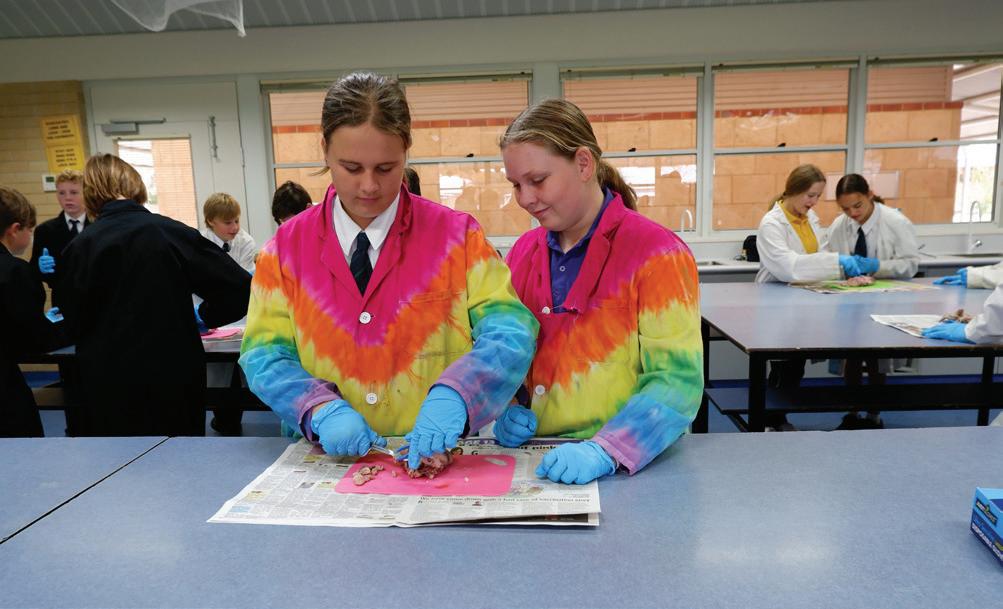
Contact: Miss Leah Stone
This course gives students a chance to explore what it is to be human; how the human body works, the origins of human variation, inheritance in humans, the evolution of the human species and population genetics. Through their investigations, students research new discoveries that increase our understanding of human dysfunction, treatments and preventative measures. Practical tasks are an integral part of this course and develop a range of laboratory skills; for example, biotechnology techniques. Students learn to evaluate risks and benefits to make informed decisions about lifestyle and health topics, such as diet, alternative medical treatments, use of chemical substances and the manipulation of fertility.
GENERAL
Subject code: HBY
List: B
Recommended: Year 10 English ‘C’ grade, Year 10 Science ‘C”’ grade
Contact: Miss Leah Stone
The Human Biology General course gives students a chance to explore how the human body works. Students focus on bones, muscles, nerves and hormones, and how they maintain the body to act in a coordinated manner. The causes and spread of disease and how humans respond to invading pathogens are studied, as well as the role of males and females in the process of reproduction. Students investigate the body systems through dissections and practical examination of cells, organs and systems. They research contemporary treatments for dysfunctions of the body systems and data is used to investigate transmission of diseases from a historical perspective and recent global incidences.

P41 YEAR 11 & 12
PHYSICS
ATAR
Subject code: PHY
List: B
Year 11 Prerequisite: Year 10 Science ‘B’ grade, B in Mathematics 10 Extension
Contact: Miss Leah Stone
In Physics ATAR, students will learn how energy and energy transformations can shape the environment from the small scale, in quantum leaps inside an atom’s electron cloud, through the human scale, in vehicles and the human body, to the large scale, in interactions between galaxies. Students have opportunities to develop their investigative skills and use analytical thinking to explain and predict physical phenomena. Students plan and conduct investigations to answer a range of questions, collect and interpret data and observations, and communicate their findings in an appropriate format. In Physics, students develop their understanding of the core concepts, models and theories that describe, explain and predict physical phenomena.

PSYCHOLOGY
ATAR
Subject code: PSY
List: List B Year 11 Prerequisite: Year 10 English ‘C’ grade, Year 10 Science ‘B’ grade
Contact: Miss Leah Stone
In the Psychology ATAR course, students will be introduced to psychological knowledge, which supports an understanding of the way individuals function in groups. Students learn about major psychological models and theories, and the methods used to conduct scientific investigations in the discipline of psychology. Students apply research methods and ethical principles as they analyse data to illustrate how we examine phenomena, such as memory, attention, attitudes, personality and group behaviour. Acquiring this foundation of scientific method and critical thinking is a valuable skill, which students can apply throughout their study, work and everyday lives.

P42
Technology
BUILDING & CONSTRUCTION

General
Subject code: BCN
List: B
Recommended: Year 10 English ‘C’ grade
Contact: Mr Steven Riddell
The Building and Construction General course develops students’ knowledge and practical appreciation of building technologies. The course provides students with a context in which to practise and integrate their knowledge and apply it to meet community and environmental responsibilities. It develops their knowledge of environmental issues. It allows them to apply and extend mathematical knowledge and strategies for problem solving. It develops their skills in planning and management, in technical communication and in the use of information technologies. In achieving the course outcomes, students learn and practise building processes and technologies, principles of design, planning and management and social considerations. The course is an introduction to further studies in trades, engineering and architecture. The course leads to employment options, further vocational education and industry training.
CHILDREN, FAMILY & THE COMMUNITY

General
Subject code: CFC
List: A
Recommended: Year 10 English ‘C’ grade
Contact: Mr Steven Riddell
The Children, Family and the Community General course focuses on factors that influence human development and the wellbeing of individuals, families and communities. Students will progress through units in early growth and development, family diversity, discussing the various influences that impact on the ability of individuals and families which lead healthy lives and analyse resources and services for families. Students will also develop resources that support the development of children and develop a care package for an individual or family in need. Some of the students will get the opportunity to observe and assist in the Early Childhood classrooms at school. This course caters for students seeking career pathways in areas such as education, nursing, community services, childcare and health.
P43 YEAR 11 & 12
ENGINEERING
General
Subject code: BCN
List: B
Recommended: Year 10 English ‘C’ grade
Contact: Mr Steven Riddell
The Engineering Studies General course is essentially a practical course focusing on real-life contexts. Students apply a design process to research and present information about materials, engineering principles, concepts and ideas, and design proposals. Students further develop their engineering and technology skills in planning and implementing a process whilst manipulating tools and machines to produce a final prototype that meets designed solutions. The majority of the course will focus on mechatronic based Arduino or Raspberry Pi control projects. Those students with a desire to take a pathway in a electronic control or technical careers will find this course highly beneficial as it prepares them for the experiences they will later encounter.
FOOD SCIENCE TECHNOLOGY

General
Subject code: FST
List: B
Recommended: Year 10 English ‘C’ grade
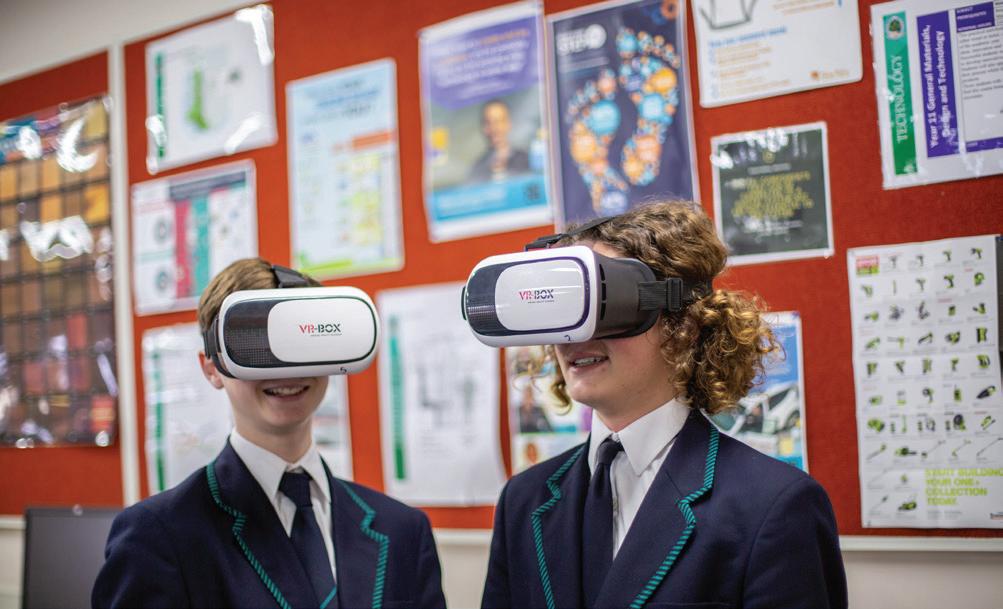
Contact: Mr Steven Riddell
Food Science and Technology General course students develop their interests and skills through the design, production and management of food-related tasks. They develop knowledge of the sensory, physical, chemical and functional properties of food and apply these in practical situations. Students explore innovations in science and technology and changing consumer demands. New and emerging foods encourage the design, development and marketing of a range of products, services and systems. Food and allied health sectors represent a robust and expanding area of the Australian and global employment markets. The Food Science and Technology General course enables students to connect with further education, training and employment pathways and enhances employability and career opportunities in areas that include nutrition, health, food and beverage manufacturing, food processing, community services, hospitality, and retail.
P44
MATERIALS DESIGN TECHNOLOGY

General
Subject code: MDTW
List: B
Recommended: Year 10 English ‘C’ grade
Contact: Mr Steven Riddell
The Materials Design and Technology General course is a practically enriched course that allows students the opportunity to work with a combination of natural and manmade wooden or metallic materials. Using these to individually design and manufacture two typical highly decorative household products over the course of the academic year. The four units covered across the course promote and support design thinking, innovation and continued skills development. Successful students will research and test materials using a variety of strategies to develop innovative and creative ideas to the design situation and bring their final project to fruition. Students will also apply time management and workplace safety when planning and implementing their process whilst they manipulate these tools and machines to produce high-quality products. Those students with a desire to take a pathway in construction, trade, design or technical careers will find this course highly beneficial as it prepares them for the experiences they will later encounter.
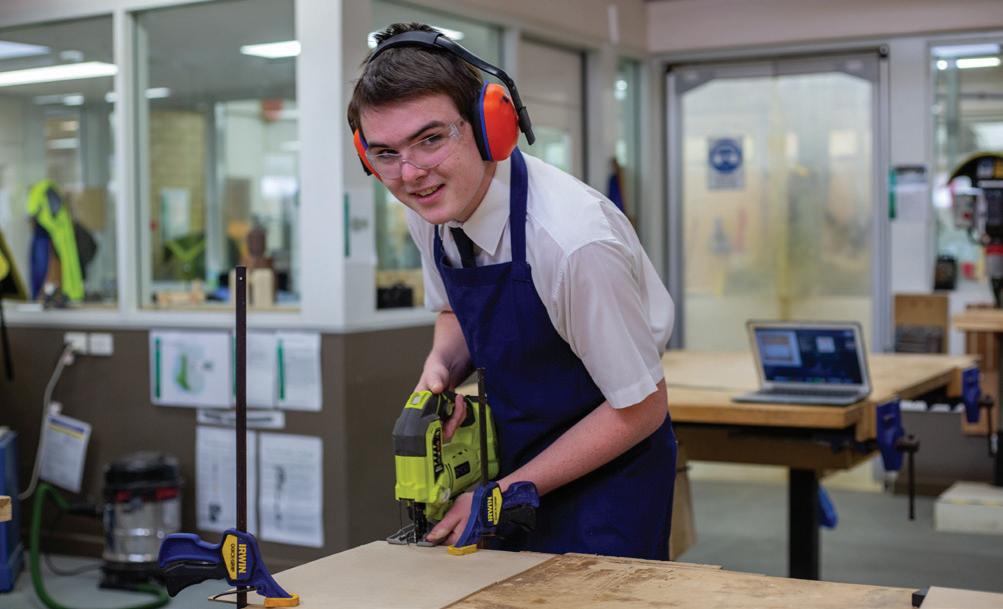
YEAR 11 & 12
Vocational Education & Training
What is VET?
Vocational Education and Training (VET) engages Senior School students in work-related learning built on strategic partnerships between GMAS, training organisations, business, industry and the wider community. VET courses are delivered by a Registered Training Organisation (RTO) such as TAFE and/or private training providers.
A Year 10 student, in consultation with the Head of Curriculum and Head of VET, is able to access the Senior School VET program. Some external courses attract fees which are set by the RTOs and notified on acceptance of a position in the course.
South Regional TAFE and the Bunbury Regional Trade Training Centre run a comprehensive Try A Trade program which is available to interested Year 10 students throughout the year. Students can register for these programs with the Head of VET at the start of the year, or as each program is advertised.
VET Pathways
GMAS offers VET pathways that cater for varying student aspirations and academic abilities. There are many benefits to undertaking a VET course whilst at school, including:
• gaining a nationally recognised qualification
• gaining an apprenticeship or traineeship
• developing relevant industry knowledge and experience
• networking and establishing links with employers
• achieving points towards WACE graduation
• providing a pathway to employment or further study (including alternate entry to university)
Certificate Courses
VET qualifications will place students in good stead to embark on their chosen career paths. Qualifications range across four levels of Certificates (Certificate I, II, III and IV).
GMAS delivers six Certificate courses on-campus, almost all of which are free of charge. Our Certificate courses are delivered by IVET and AIET as our preferred Registered Training Organisations.
Students are also able to enrol in over 60 Certificate courses at our partner Registered Training Organisations, including TAFE and the Bunbury Regional Trade Training Centre (BRTTC). Completion of a Certificate course counts towards WACE graduation.
P46
School Based Traineeship
School based traineeships provide Senior School students with the opportunity to start a traineeship or an apprenticeship as part of their school program. It involves a combination of paid work, off-site training and on-campus study. During the traineeship, students work towards an approved Certificate course and their requirements for WACE graduation.
Selecting a School Based Traineeship Pathway
• Choose from the traineeships offered on page 25 of this handbook
• The VET department can provide students with additional information about study, training and work commitments
Endorsed Programs
Endorsed programs are for students wishing to participate in programs which are delivered in a variety of settings by schools, workplaces, universities and community organisations. These programs count towards WACE graduation. Many programs are run through the school, however GMAS will enrol and result any certified endorsed program that students elect to do outside of GMAS. Some of the types of programs GMAS regularly engages in include:
• Workplace Learning ADWPL
• WA Recreational Skipper’s Ticket

• Music Performance Ensemble
• Community Service
• Keys for Life - Pre-Driver Education course
• Elite Sports Performance
• Off Campus Enrichment program
• Navy Cadets
• The Duke of Edinburgh’s Award (Bronze, Silver & Gold)
For more information about endorsed programs, please visit the SCSA website or speak with the VET department.
You Know?
Students have the full support of the School’s dedicated VET department whilst on and off campus. The VET department liaise closely with employers and training organisations to ensure students are safe and supported on their chosen pathway.
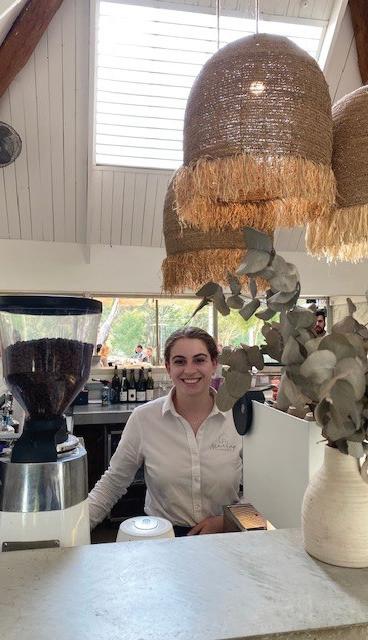
Did
YEAR 11 & 12
Workplace Learning ADWPL
Workplace Learning is a type of endorsed program. Some certificates require students to complete a work placement to gain hands-on experience in their learning area. Thursday and/or Friday are the preferred days for placements. Consideration can be made for alternative days depending on workplace needs and individual student timetables. Students are also expected to complete a significant component of their workplace hours during school holidays and/or weekends.
Workplace Learning Requirements
The following requirements must be met in ADWPL:
• a minimum of 55 hours work placement completed in each semester of the course

• 10 employability skills must be assessed
• a logbook must be submitted with evidence and signatures to support presence in the workplace
• workplace supervisor assessments are completed every 55 hours of students attending the workplace
Combined ATAR/General & VET Pathways
Students are able to enrol in a combination of ATAR/General courses and VET studies to match their academic abilities and interests. Students are invited to discuss their proposed pathways with GMAS staff.

Course Fees and School Fee Reduction
Certificate courses completed on-campus or through TAFE are usually free of charge while studying at GMAS. Courses completed at BRTTC do attract a fee set by the Centre. Depending on the chosen program, students may be required to purchase a uniform, tools, textbooks or protective equipment.
The following reduction to GMAS school fees applies to students attending TAFE, BRTTC or a school Based Traineeship:
• 2 Days per week at TAFE or BRTTC will see fees reduced by $1500 per year

• 1 Day per week at TAFE or BRTTC will see fees reduced by $750 per year
• For those who do not attend TAFE or BRTTC fees remain the same

P49
On Campus Courses
BUSINESS
Certificate II Workplace Skills
Certificate III Business
Qualification: Certificate III
Delivered by: IVet (RTO 32413)
Prerequisites: Certificate III requires completion of Certificate II

Contact: Mrs Megan Grosse
The Certificate II Workplace Skills and III Business qualifications develop your practical skills and knowledge to undertake a range of tasks in an office or business environment. You will learn skills to develop a broad range of competencies in varied office tasks, including customer service, basic accounting, workplace health and safety, workplace schedules and organisation. The Certificate III course can only be taken in Year 12 or after the completion of Certificate II. A requirement of this course is the completion of a St John’s Ambulance First Aid Certificate which costs approximately $140.
EVENTS/TOURISM

Qualification: Certificate III
Delivered by: AIET RTO 121314
Prerequisites: Nil
Contact: Mrs Megan Grosse
This one year course is designed to provide students with a thorough introduction to the skills and knowledge required to work in the events and tourism industries. Content relates to the planning, production and evaluation of events and is relevant to many different event types and industry roles. As part of the course, students obtain a nationally recognised barista qualification. This course provides a pathway to work for event or exhibition organisations operating in a range of industries including tourism and travel, hospitality, sport, cultural and community sectors. This qualification is also suitable for School Based Traineeships. Students will participate in a variety of school events to gain this qualification. The Certificate III Business can also be an extension to this qualification.
P50
SPORT & RECREATION
Certificate II Sport Coaching
Certificate III Sport and Recreation
Qualification: Certificate II or III
Delivered by: IVet (RTO 32413)
Prerequisites: Certificate III requires completion of Certificate II
Contact: Mrs Megan Grosse
This qualification provides skills and knowledge for an individual wishing to work in the fitness, sport and recreation industry. People with this qualification may provide support in the provision of fitness, sport and recreation programs including coaching and officiating. Certifications may include Level 1 Sports Trainer, Advanced First Aid, Level 1 AFL Officiating and Basic Netball Officiating. Students will participate in a variety of school events to gain this qualification. This qualification will require students to coach a GMAS sports team to complete the suggested workplace learning hours.
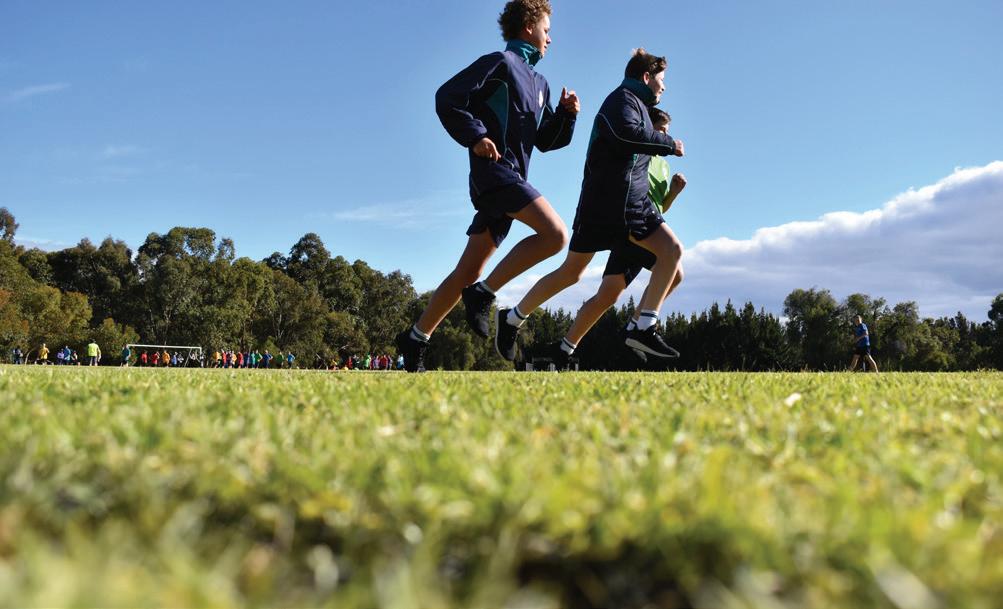
Off Campus Certificate Courses
Course descriptors for the off-campus Certificate courses listed on pages 24-25 are available online or from the VET department.

YEAR 11 & 12
Resources
GMAS
VET/Careers Office
The following resources are available in the School Library and the VET office: university handbooks and faculty guides; career books and advice for resumés and interview skills.
GMAS Careers
A dedicated online platform to help students make decisions about future careers and life beyond school. www.gmascareers.com
My Future
A very useful source of information to supplement student knowledge about career interests. www.myfuture.edu.au
Heads of School/Department
Heads of School/Department are available for advice and counselling in relation to Senior School pathways.

Head of Curriculum - Mr Philip Deroost
Head of Senior School - Mr Steve Treloar
Head of VET/Careers - Mrs Megan Grosse
Head of The Arts - Mr Philip Watts
Head of English/Languages - Ms Paisley Walker
Head of HASS - Ms Heather Fink
Head of Health & PE - Mrs Robyn Vogel
Head of Mathematics - Dr Amanda Draper
Head of Science - Miss Leah Stone
Head of Technology - Mr Steven Riddell Head of CRS - Father Earle Chamberlain
54
Tertiary Institutes
Curtin University www.curtin.edu.au
Edith Cowan University www.ecu.edu.au
Murdoch University www.murdoch.edu.au
South Regional TAFE www.southregionaltafe.wa.edu.au
University of Notre Dame www.notredame.edu.au University of Western Australia www.uwa.edu.au
Governing Bodies
TISC Tertiary Institutions Service Centre
For information about tertiary courses and admissions. www.tisc.edu.au
School Curriculum & Standards Authority (SCSA)
Responsible for the Year 11 and 12 curriculum, assessment, standards and reporting for WA schools. Official source of information for WACE. www.scsa.wa.edu.au
Department of Training & Workforce Development www.dtwd.wa.gov.au
Defence Force Careers www.defencejobs.gov.au Centrelink
(Department of Human Services) www.centrelink.wa.edu.au
Jobs & Skills Centres www.jobsandskills.wa.edu.au Job Search www.jobsearch.gov.au Job Guides Online www.myskills.gov.au
Career Services Other
Family and Friends
Students are encouraged to speak with someone who is currently employed in the type of work they are interested in. These people are in the best position to provide detailed information about the specific career.
UCAT Preparation (Med School entry) www.medentry.edu.au
P53
RESOURCES
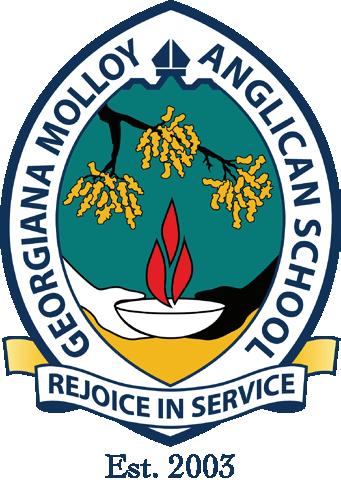



P54 2 Hawker Approach, Busselton WA 6280 PO BOX 920, Busselton WA 6280 (08) 9752 5252 enquiries@gmas.wa.edu.au gmas.wa.edu.au gmaswa Opportunities now...benefits for life A school of the Anglican Schools Commission (Inc.) w


 MR
MR




















































































